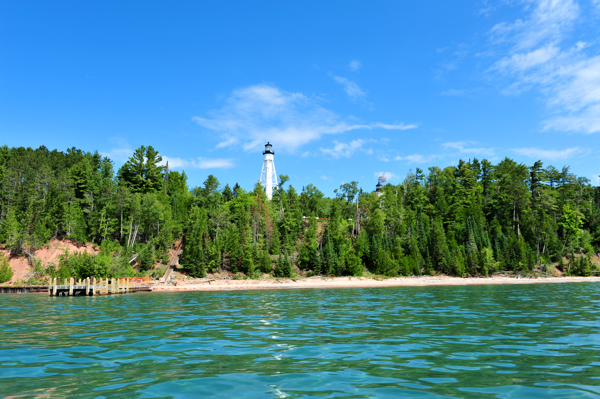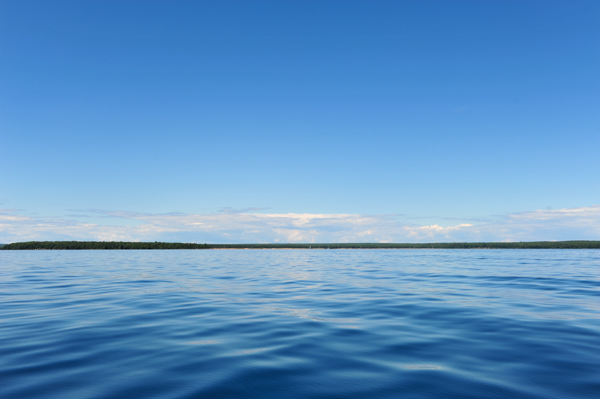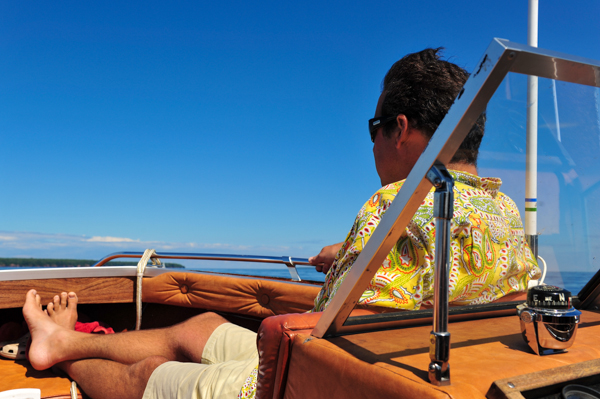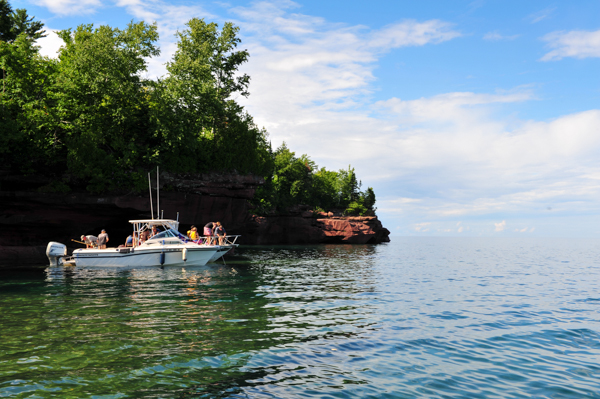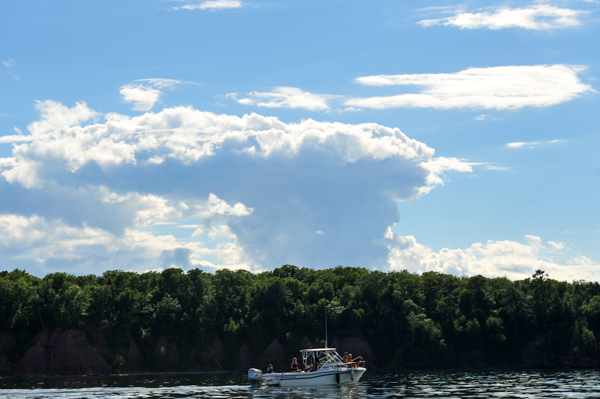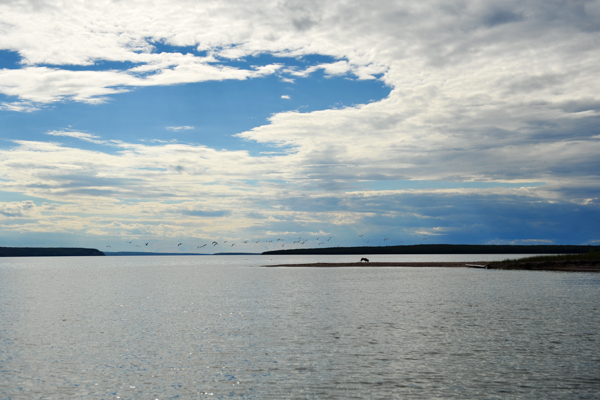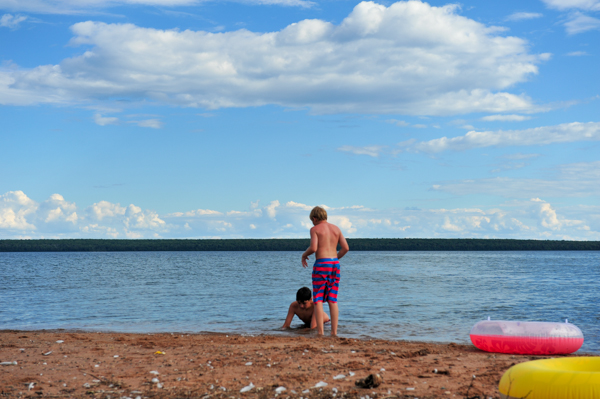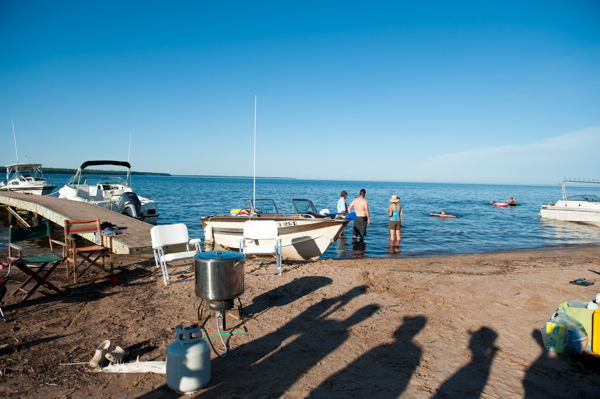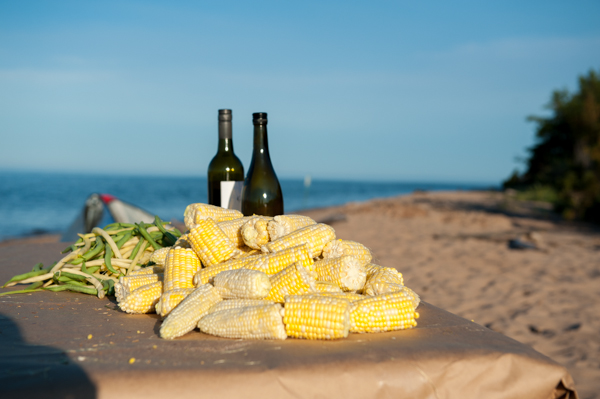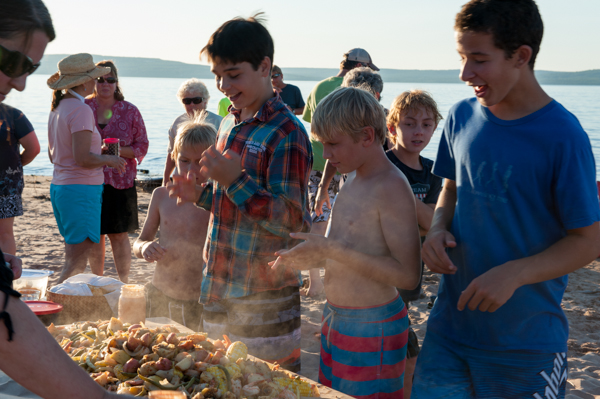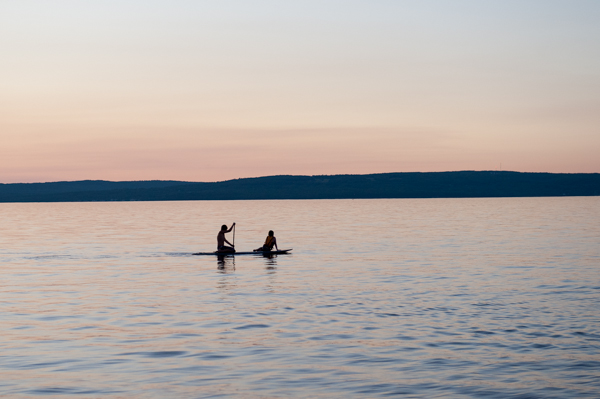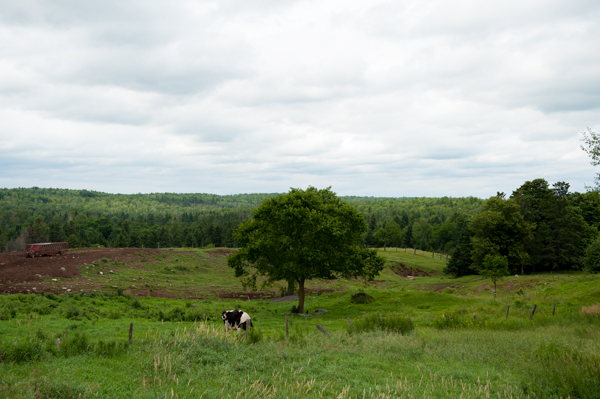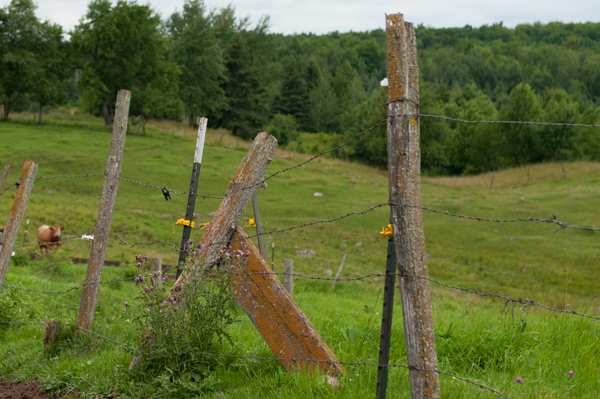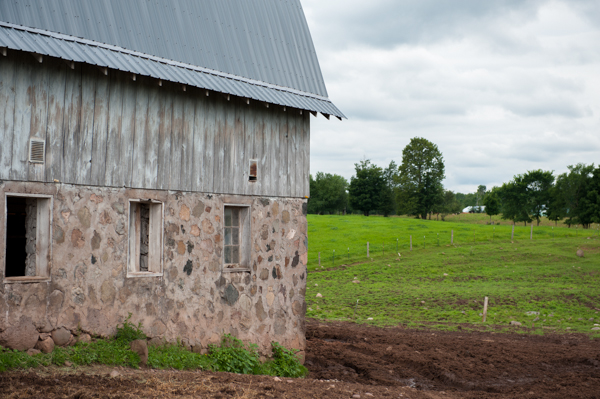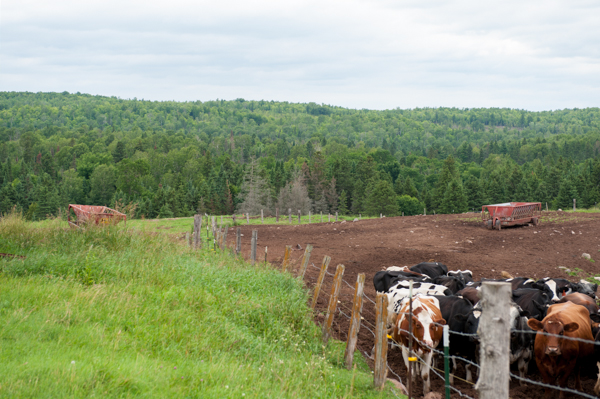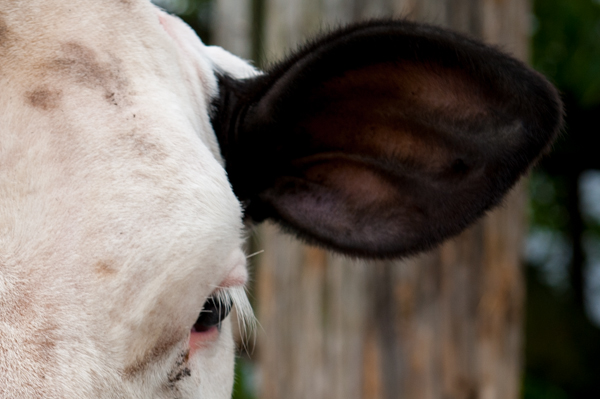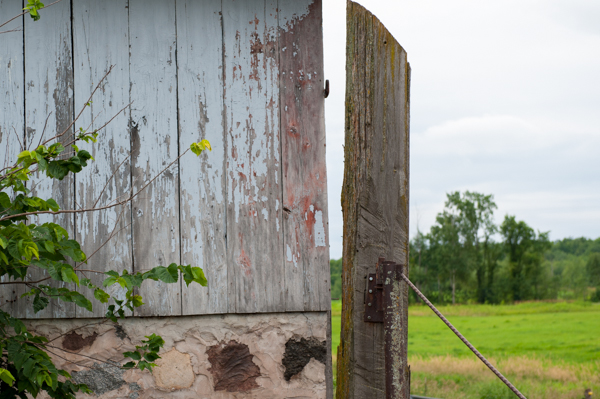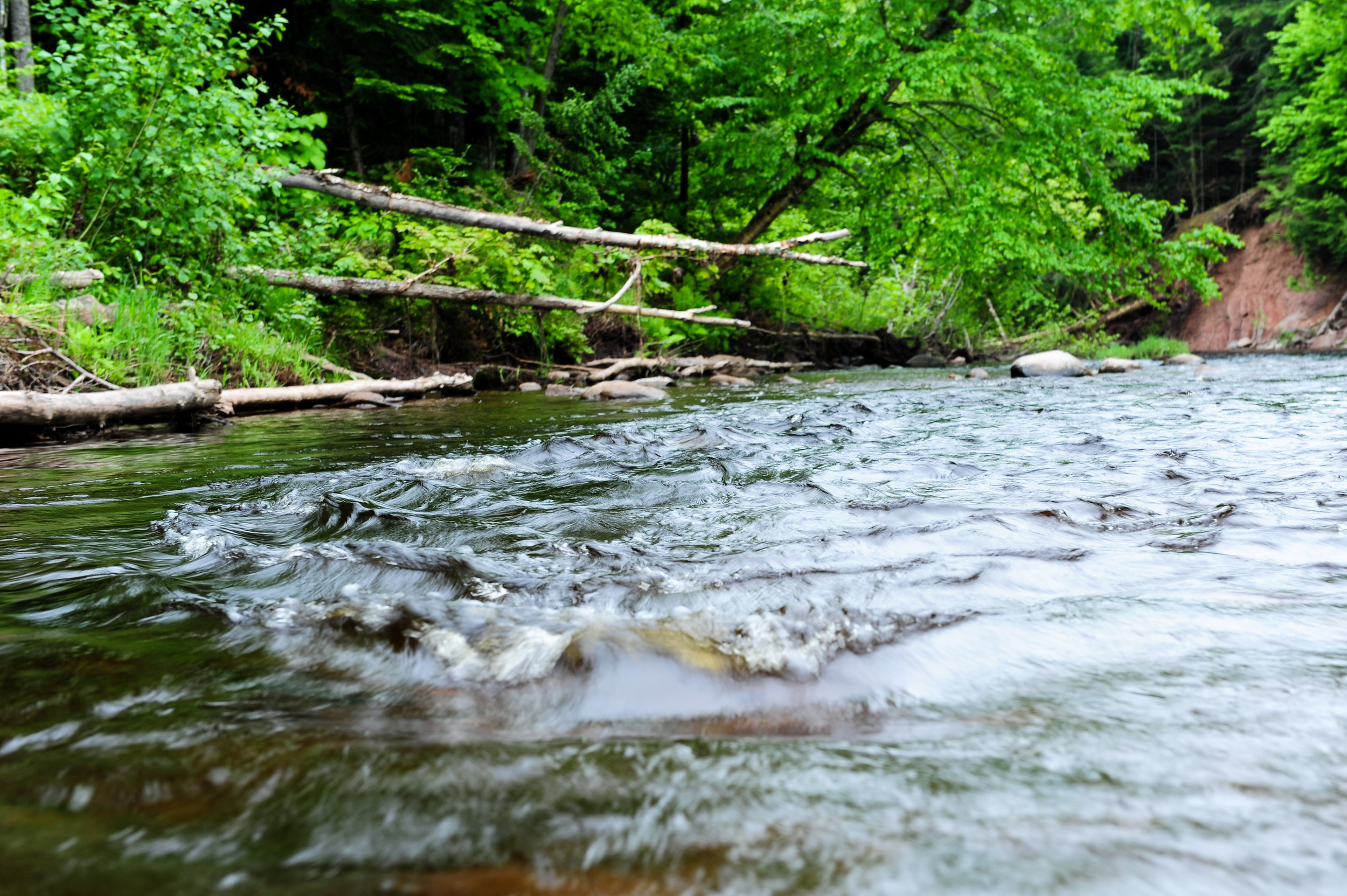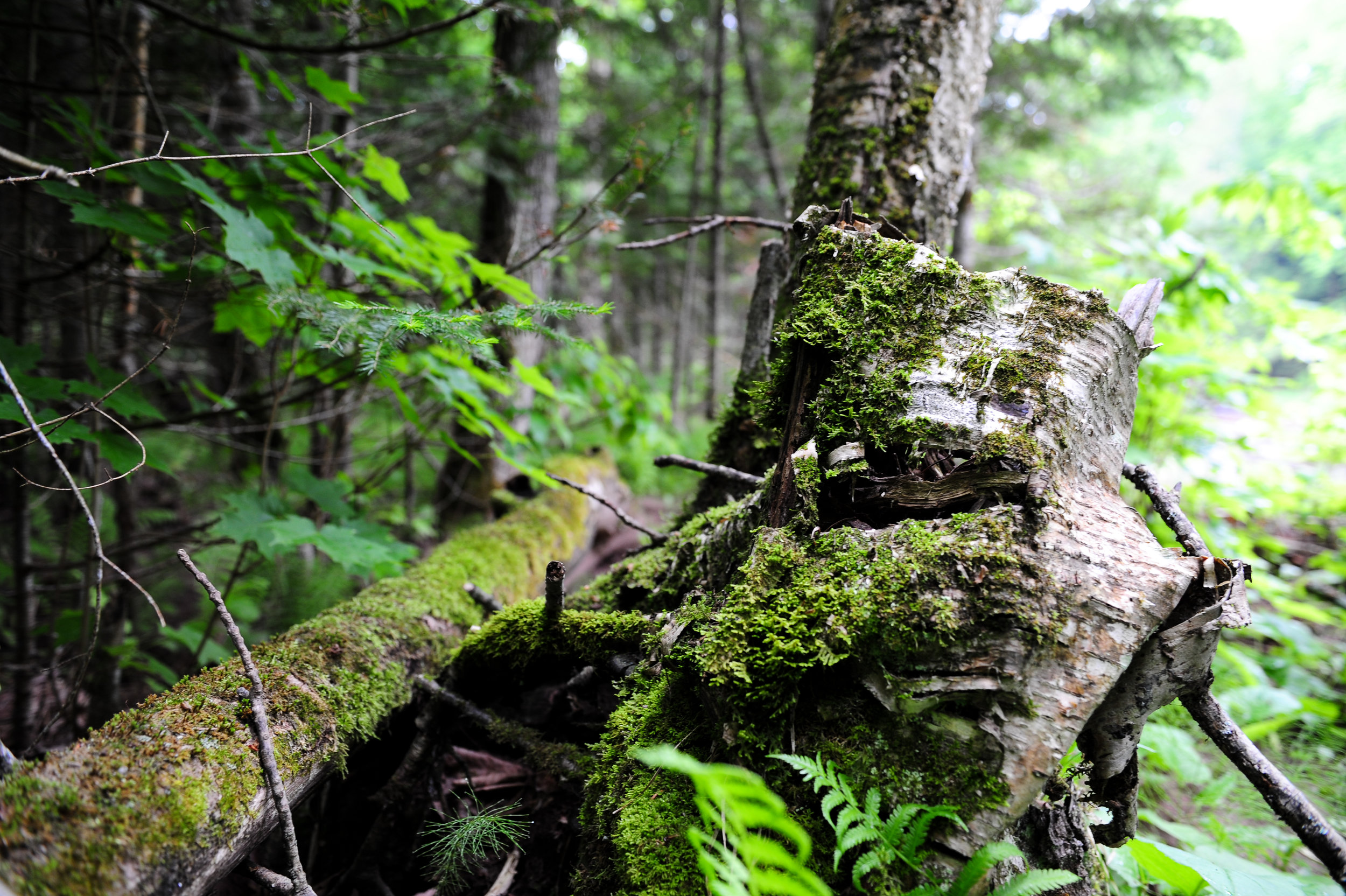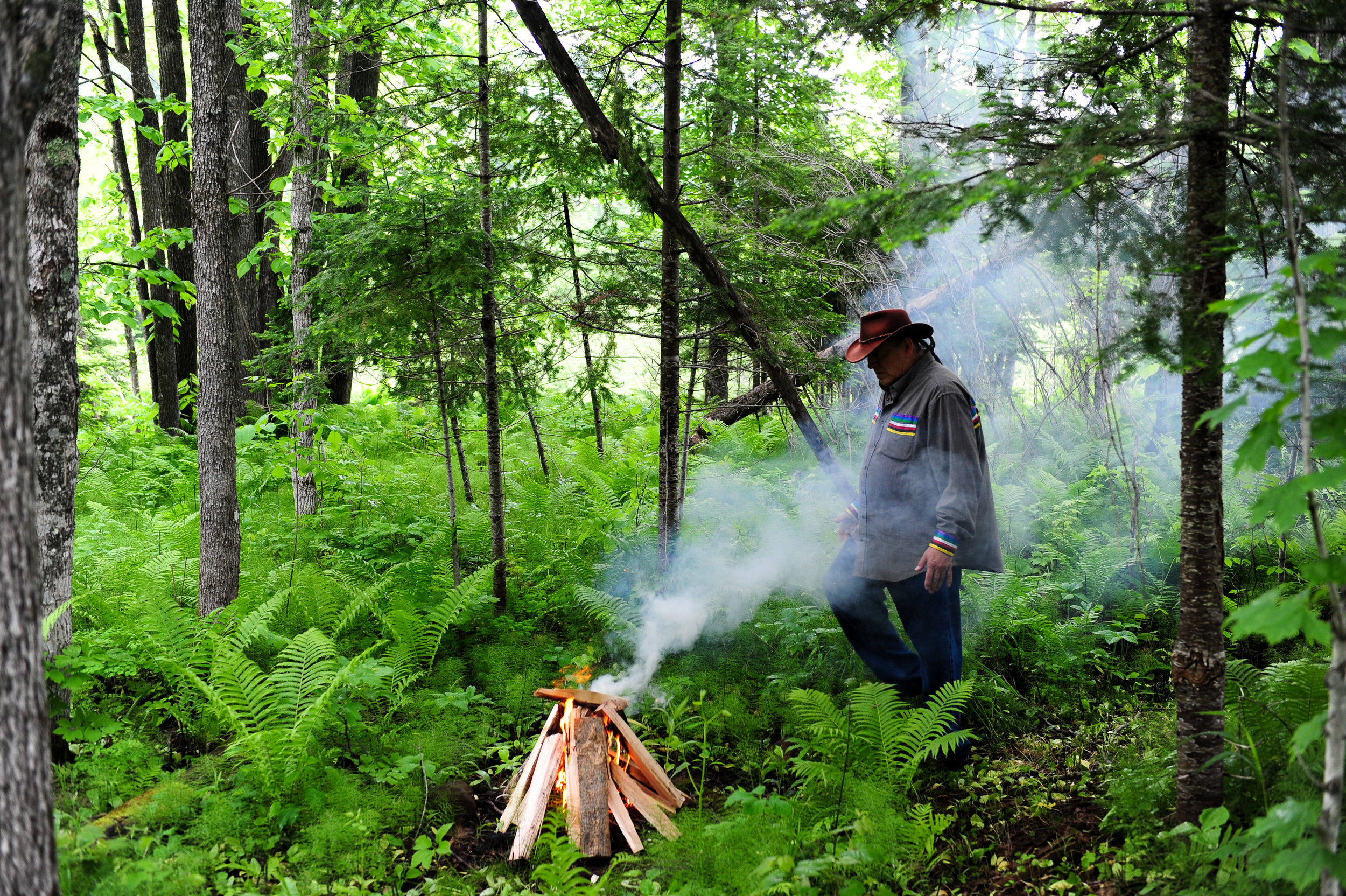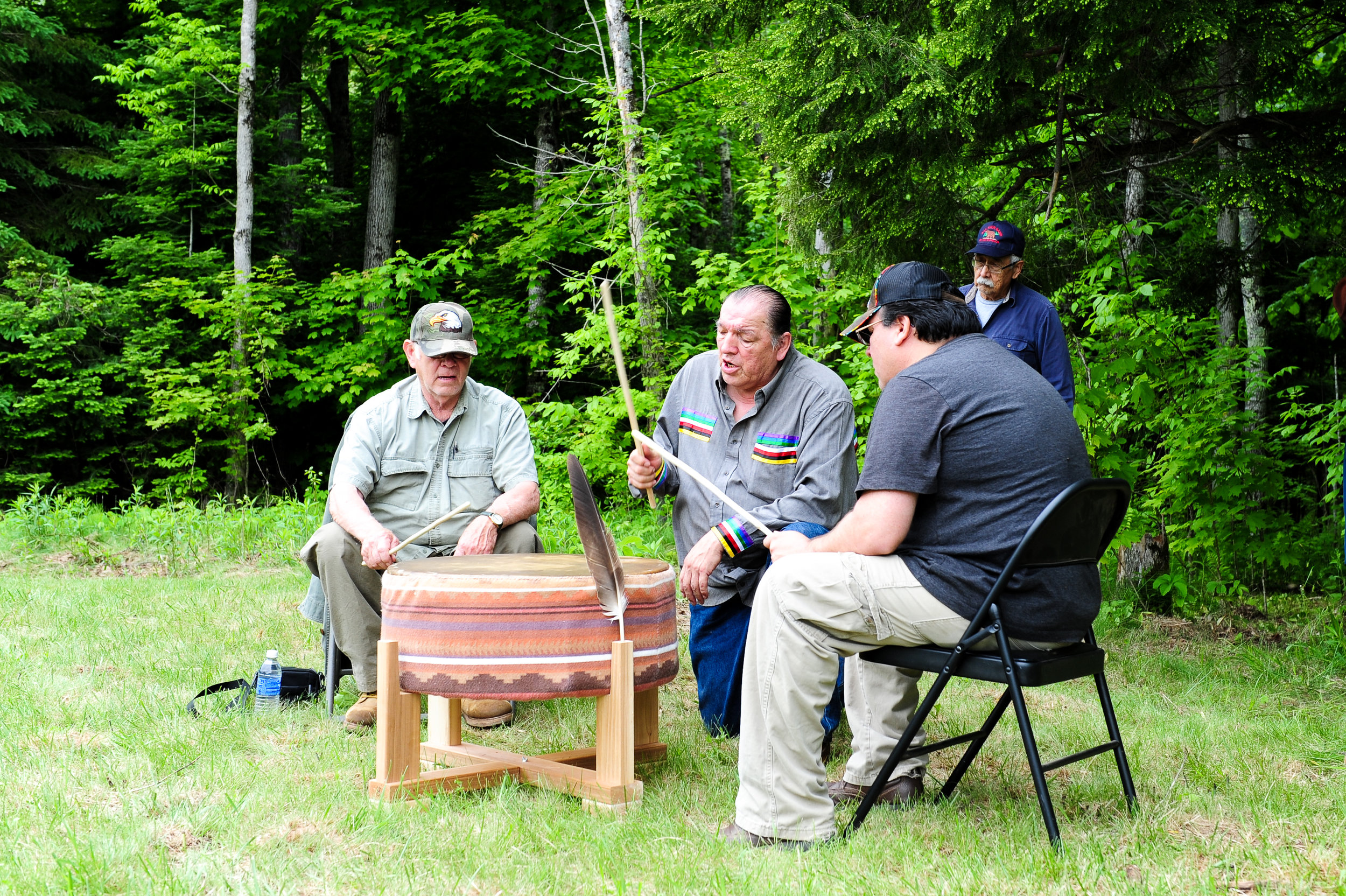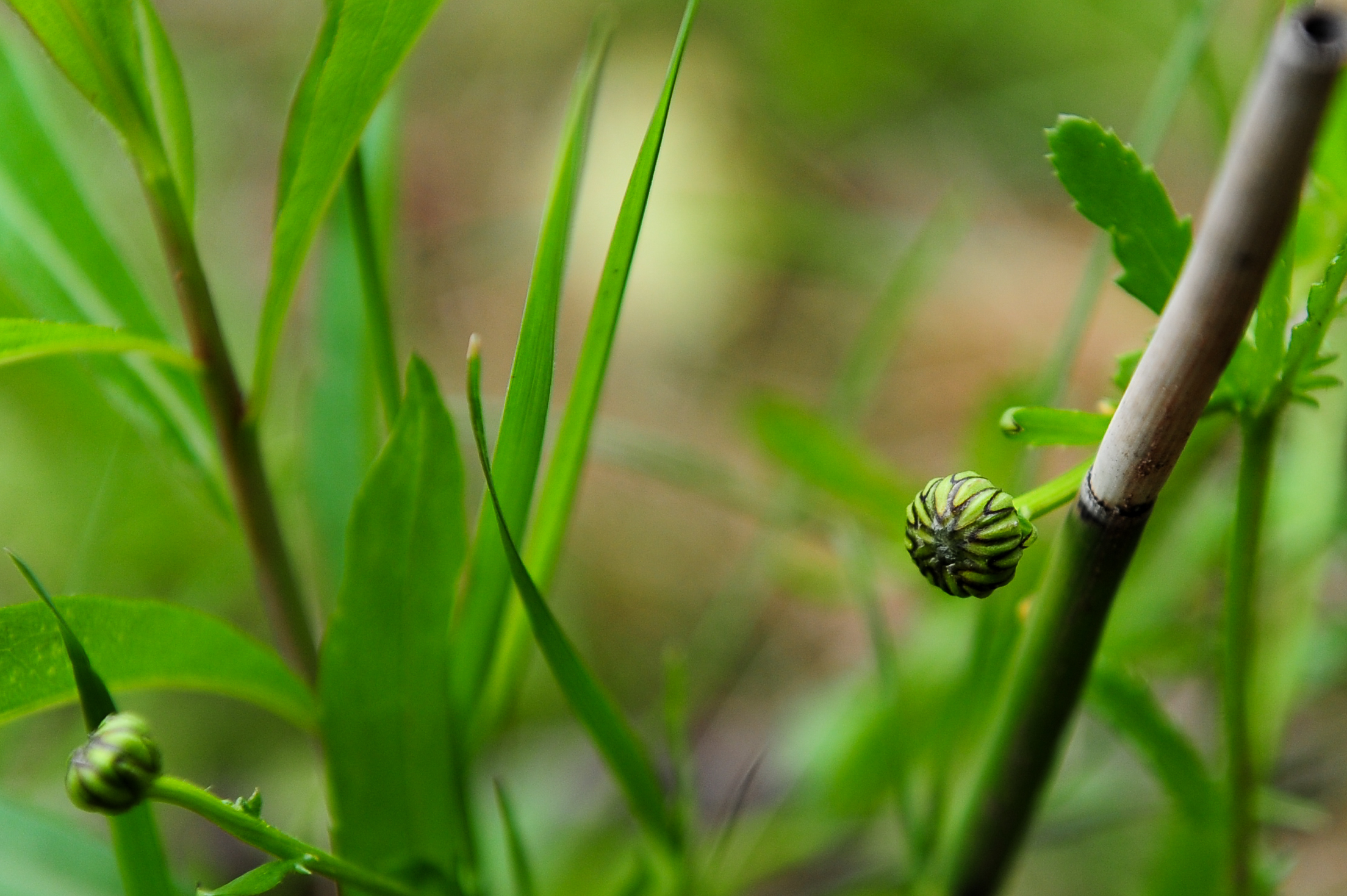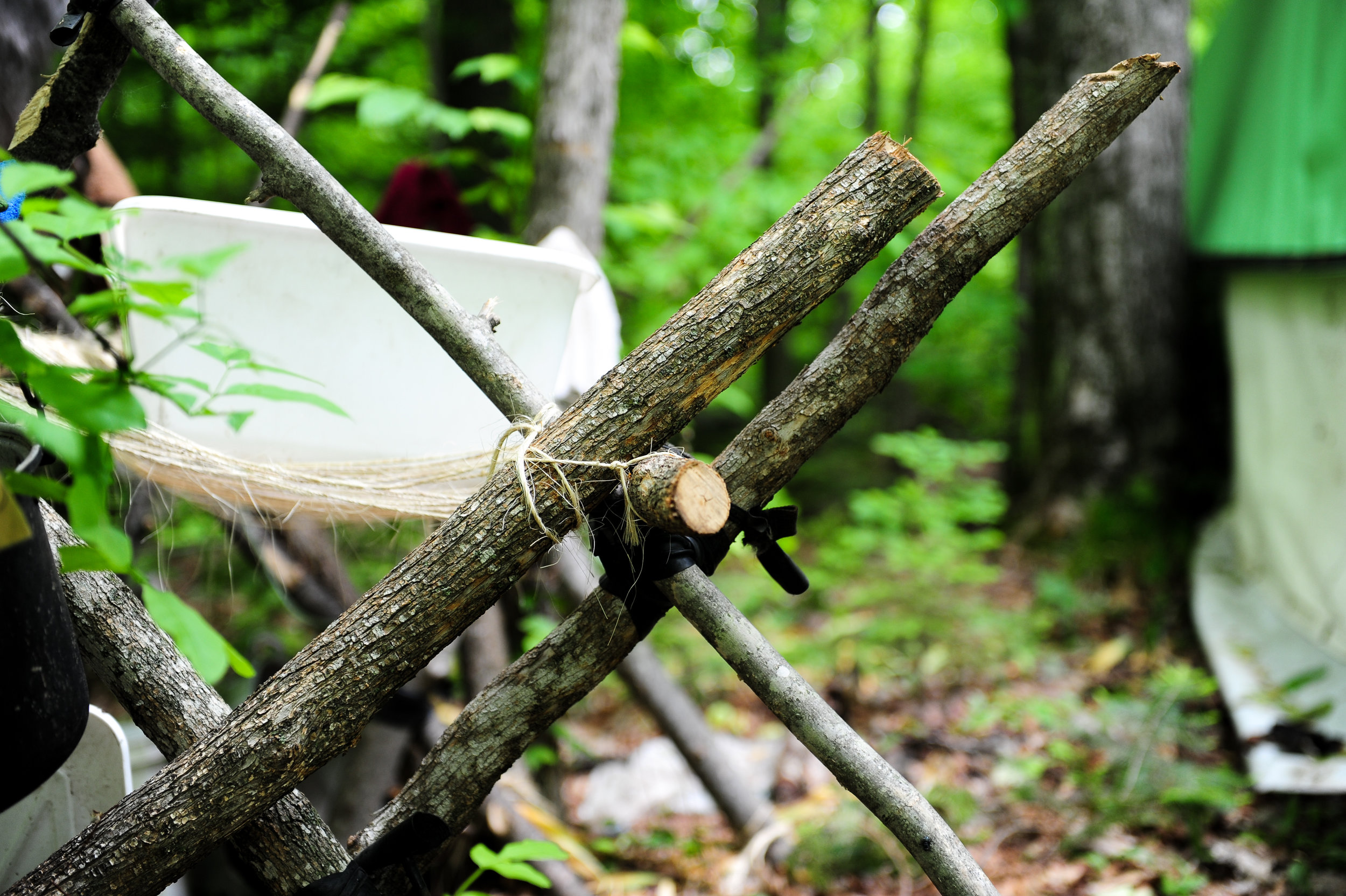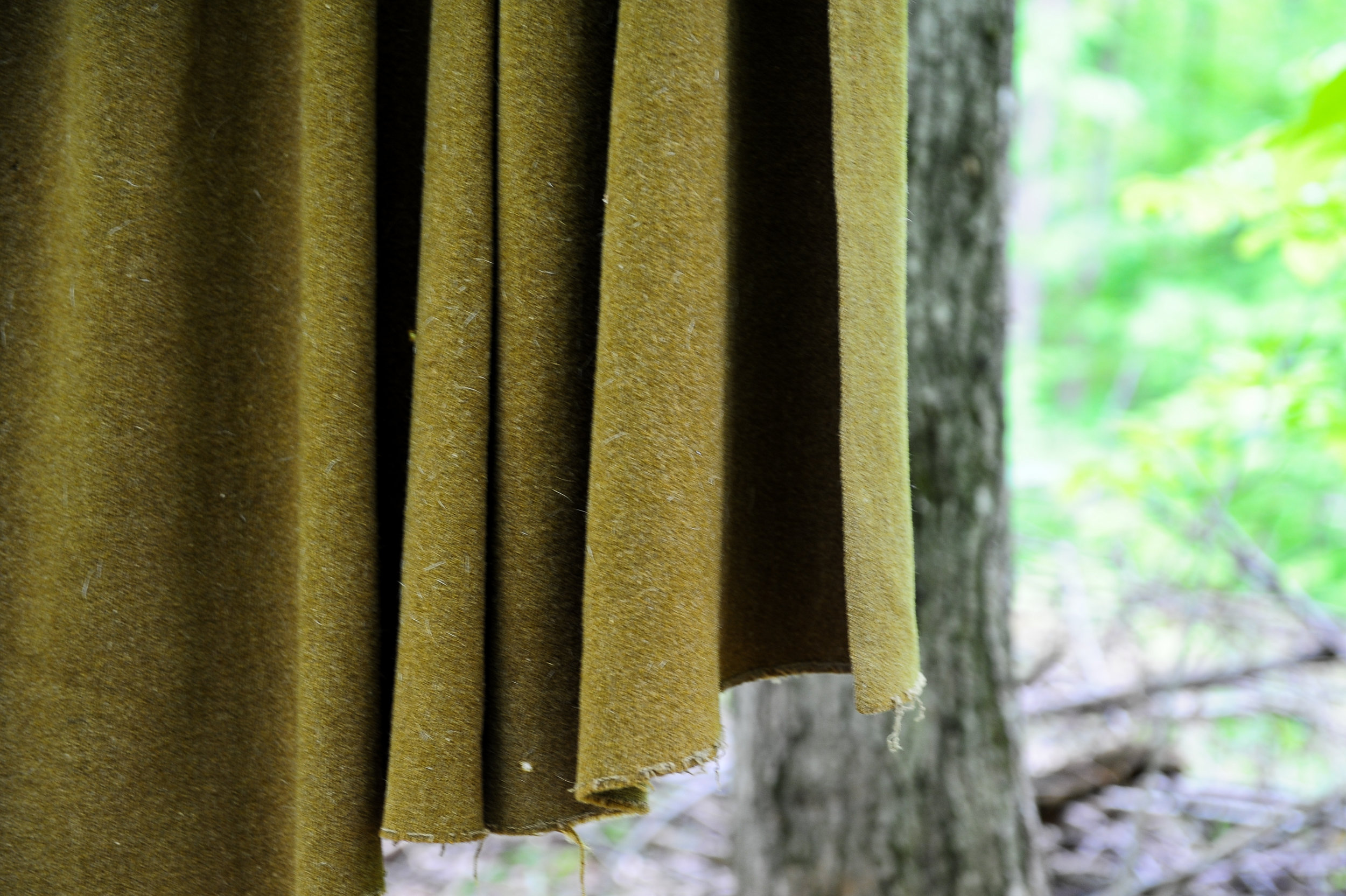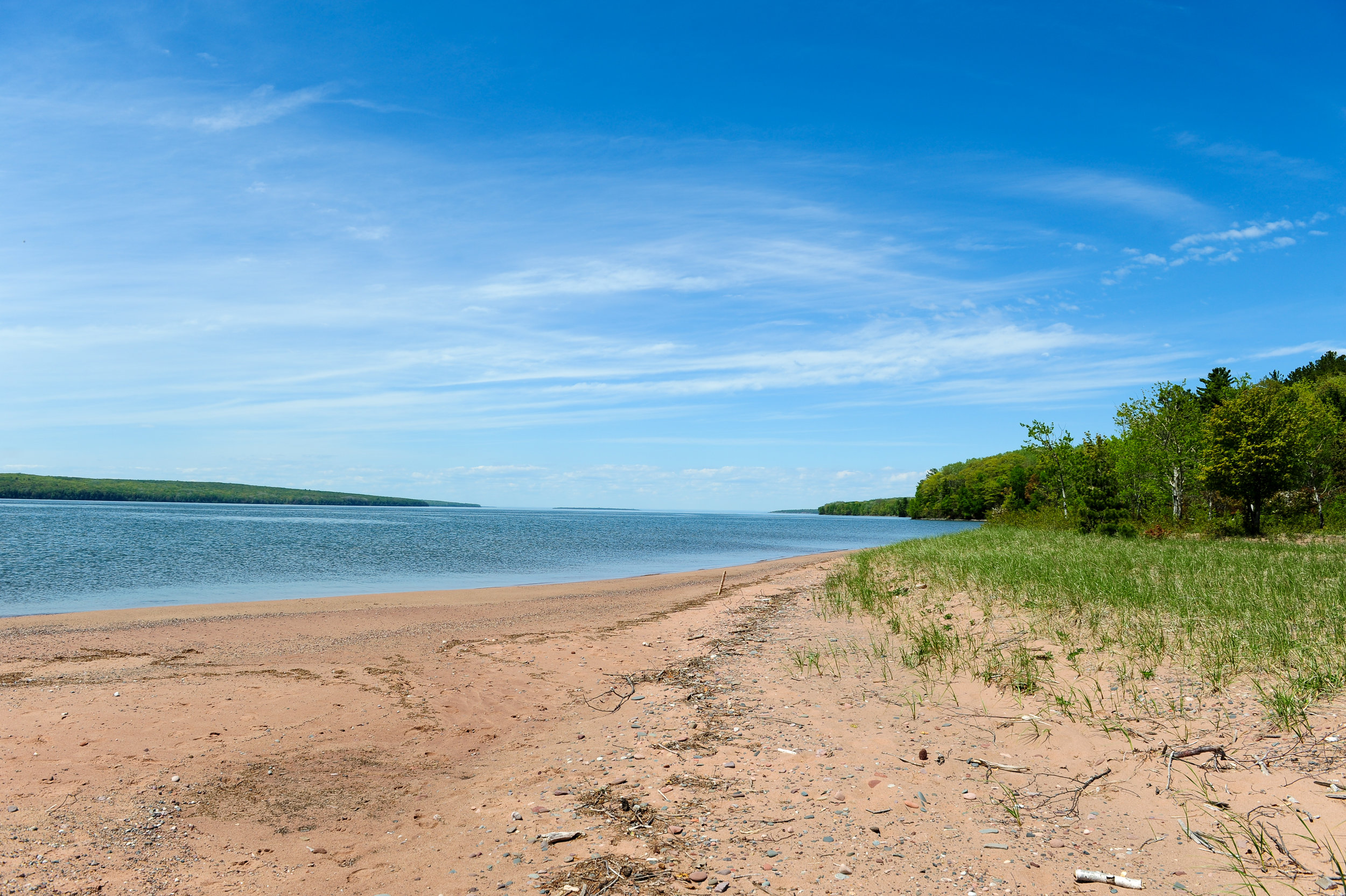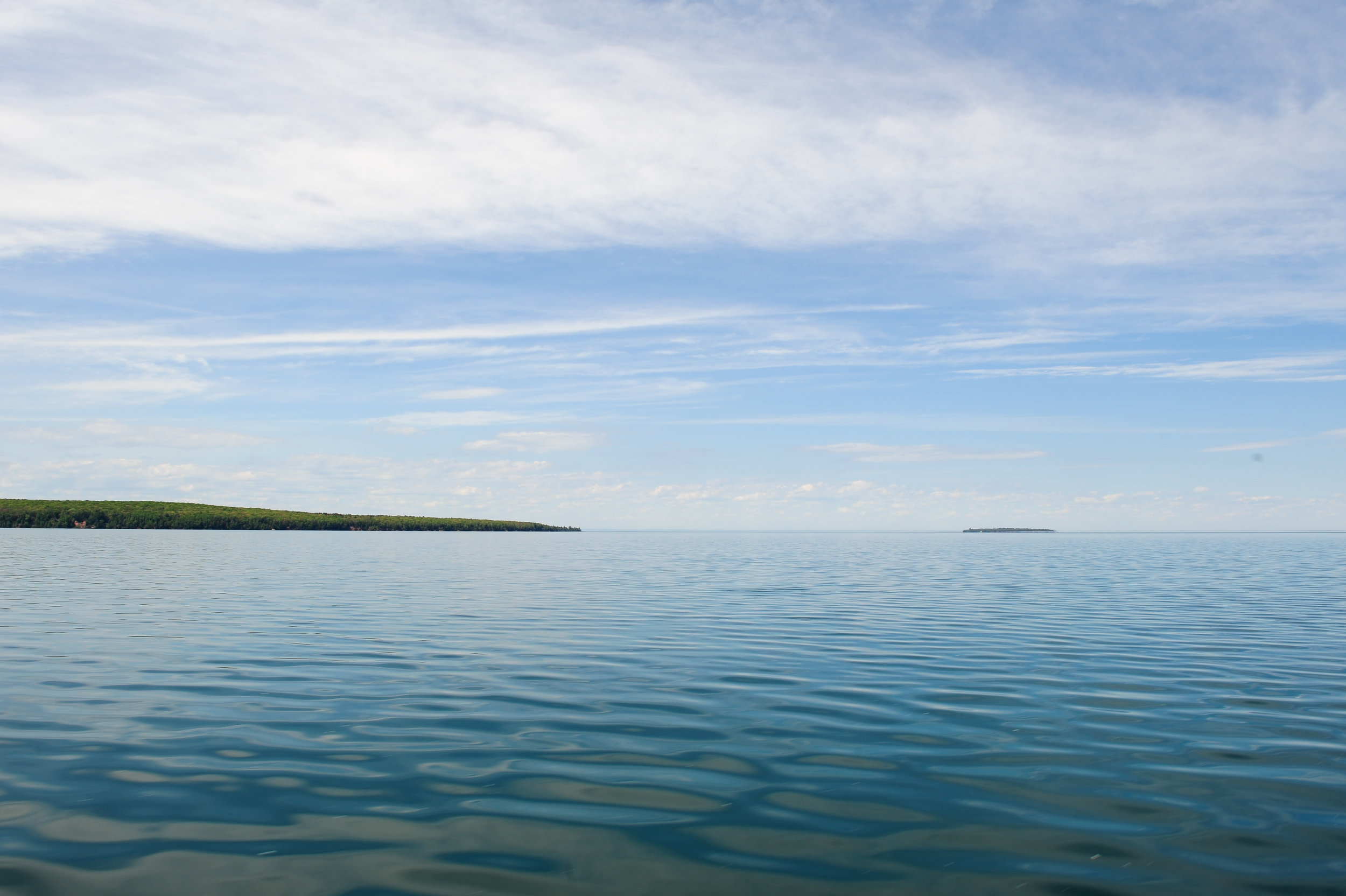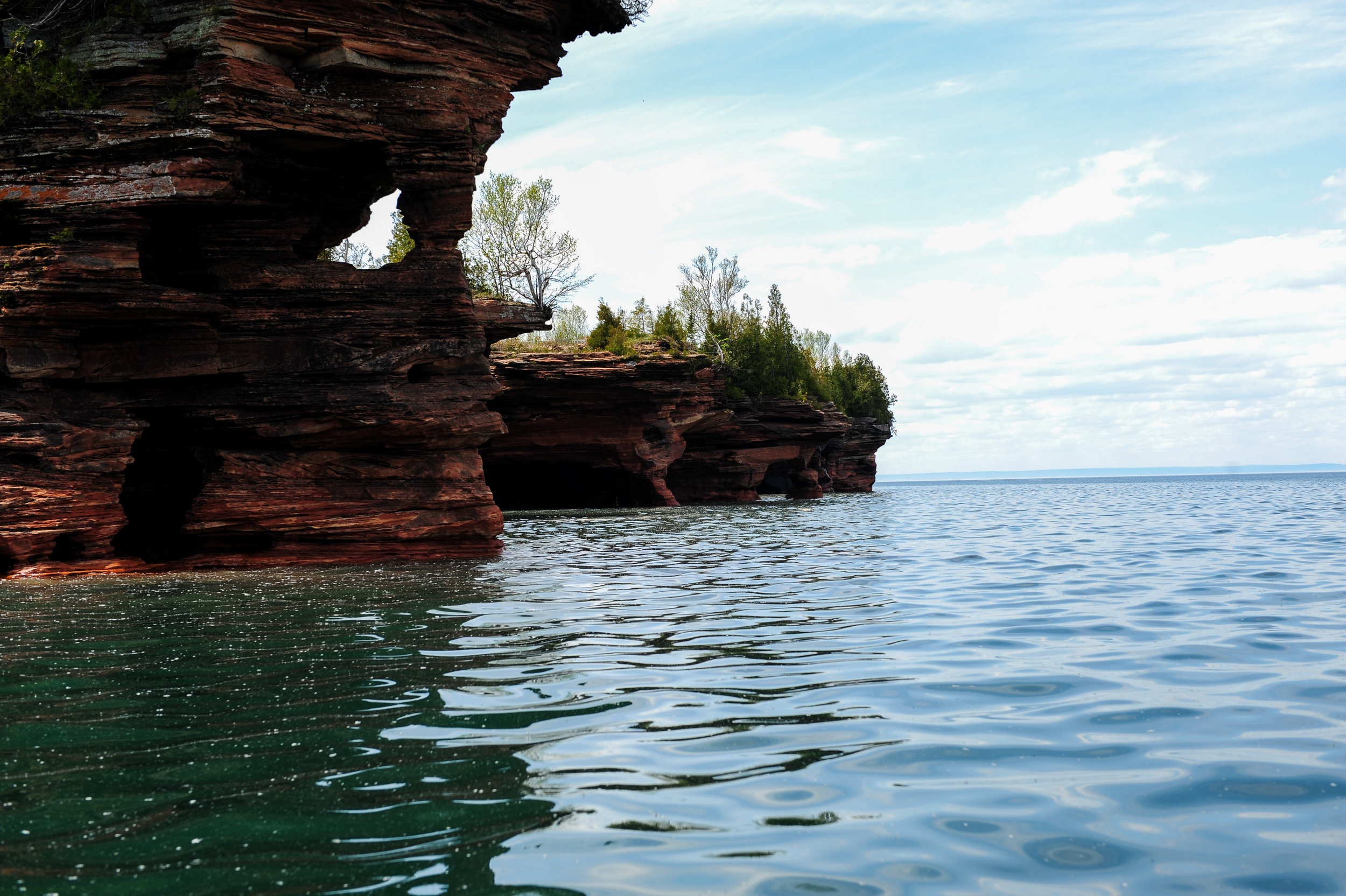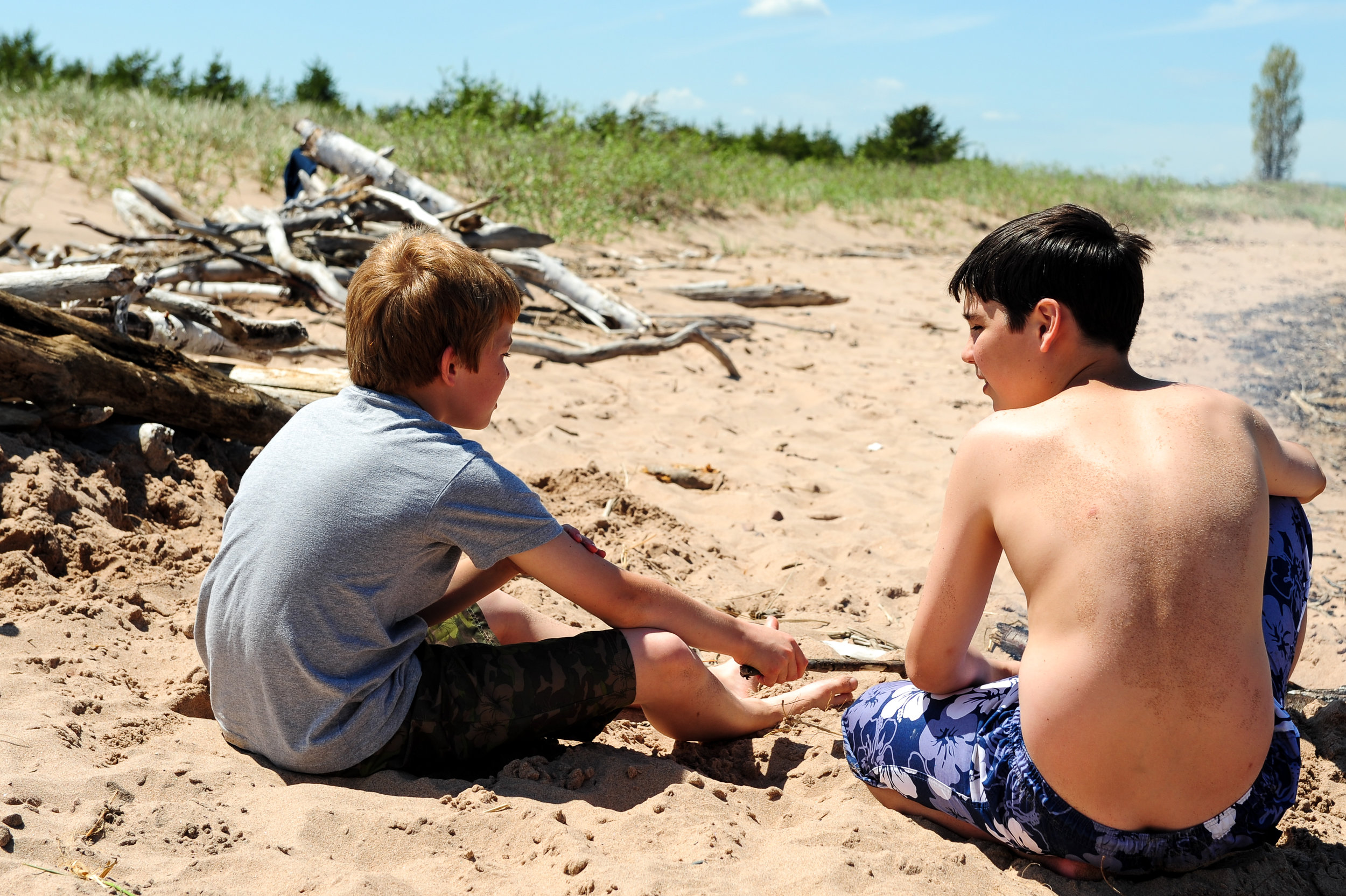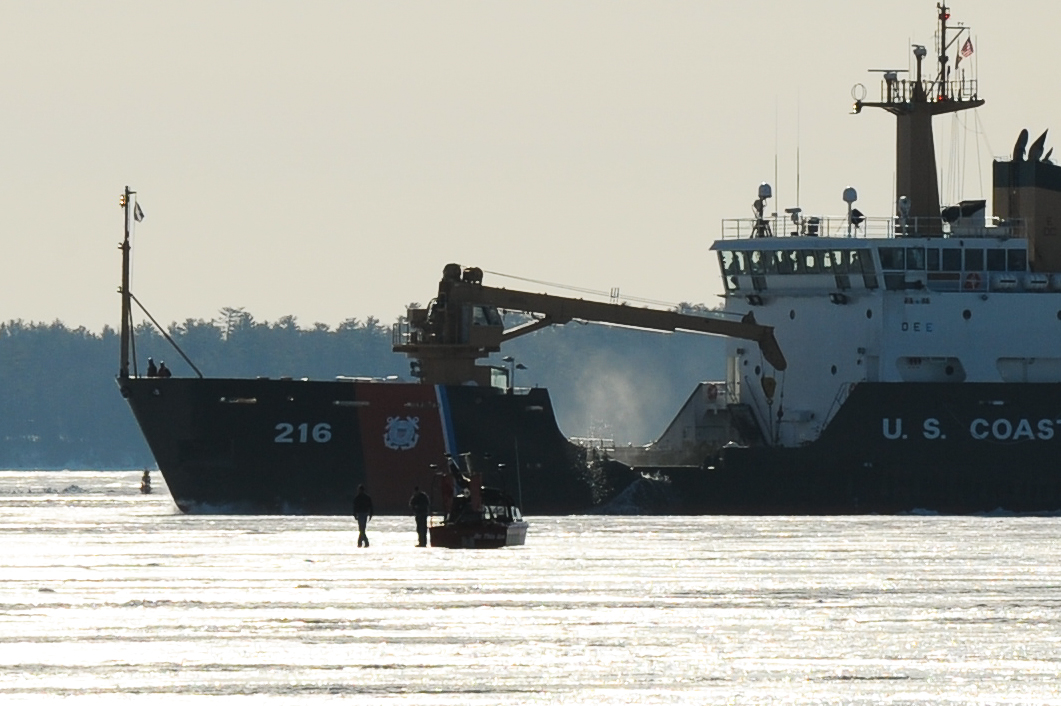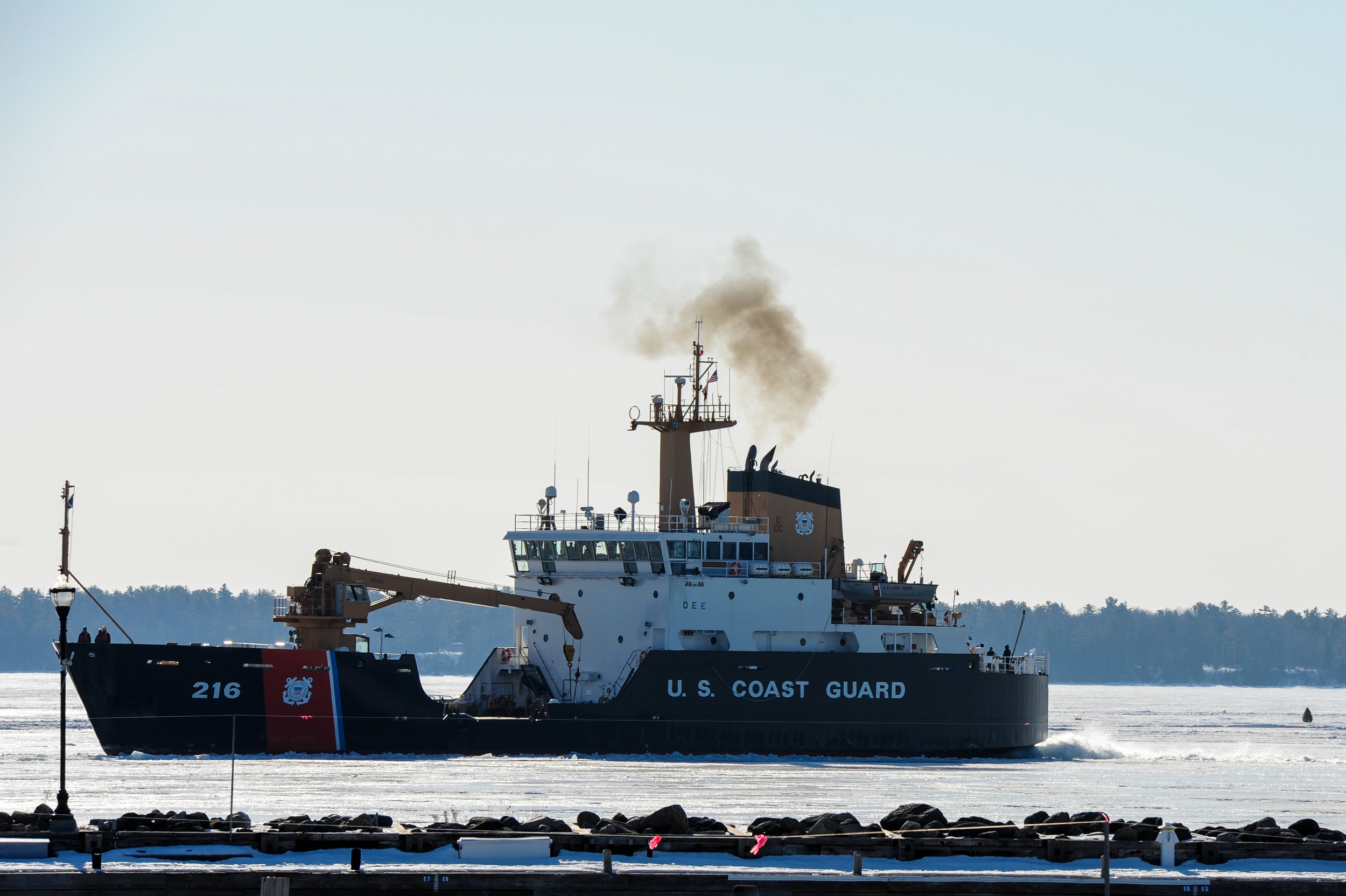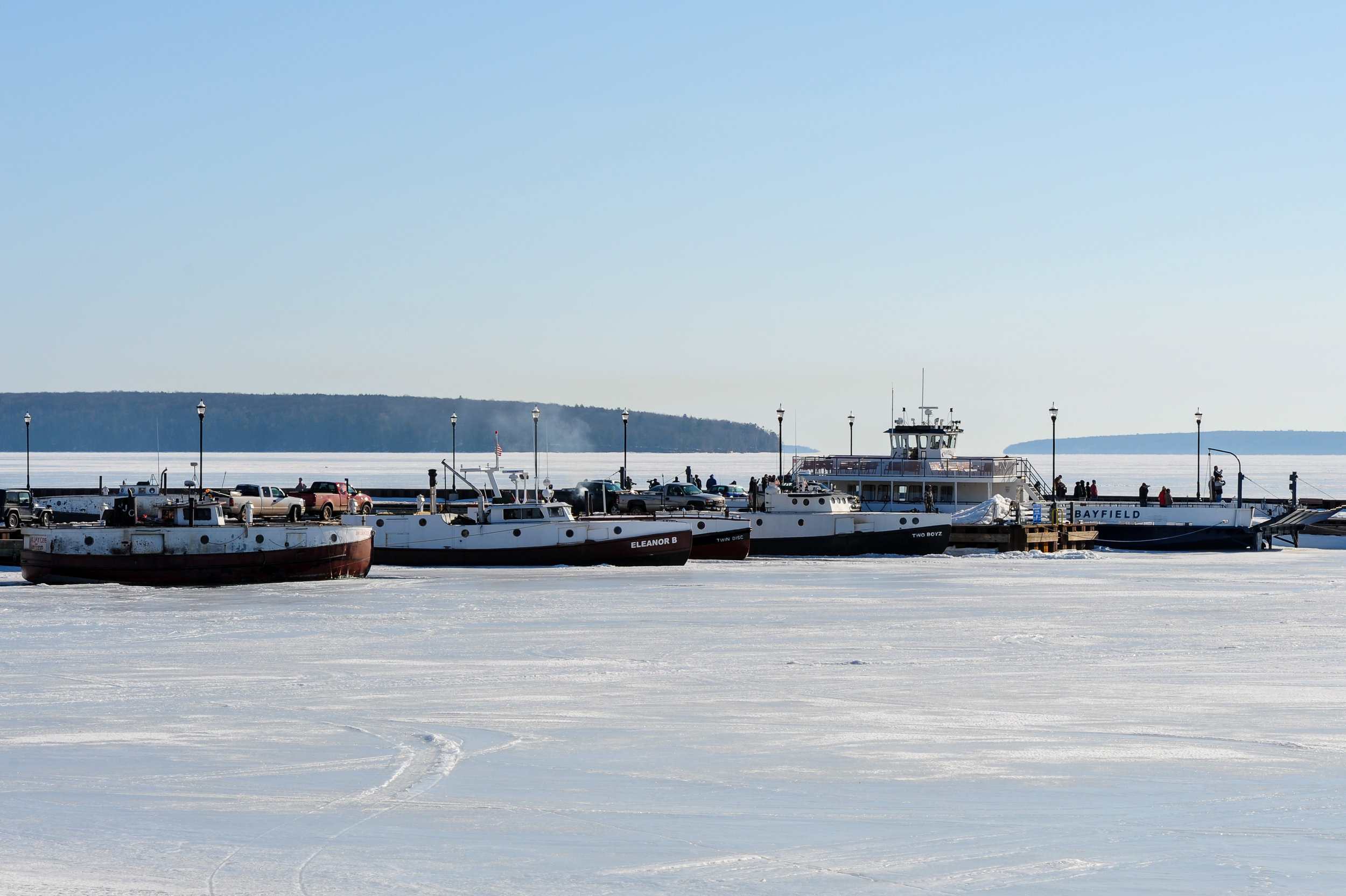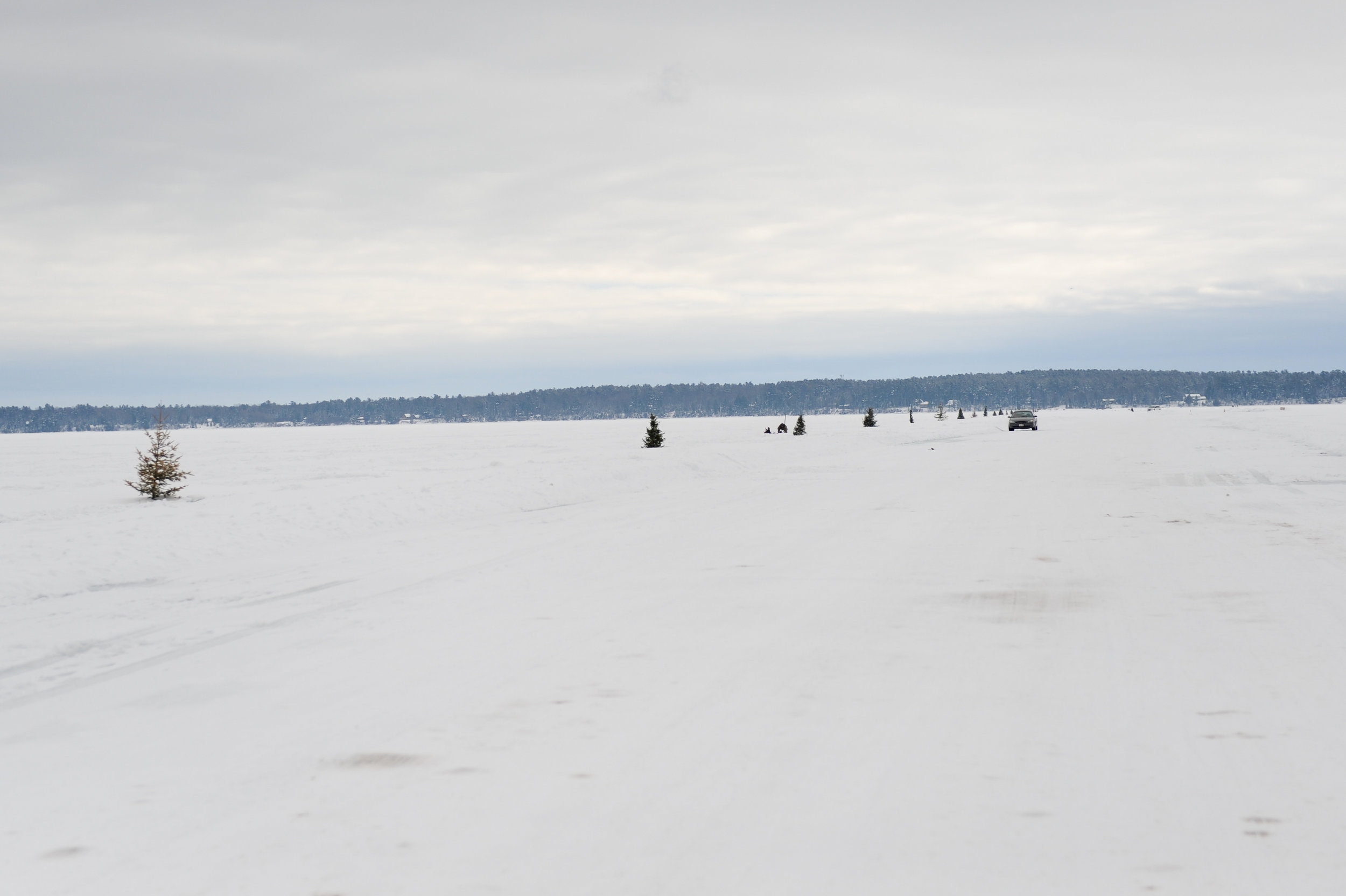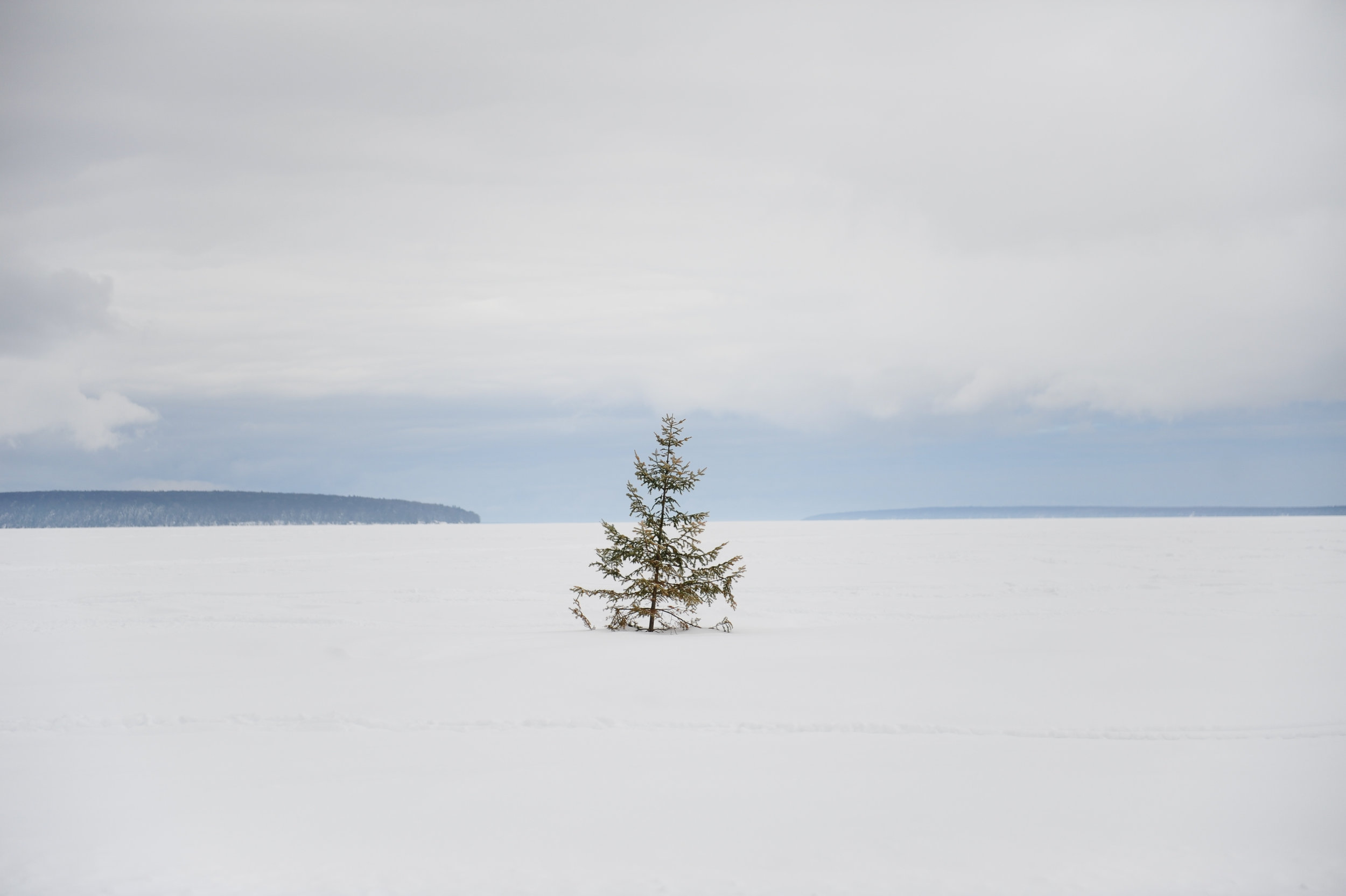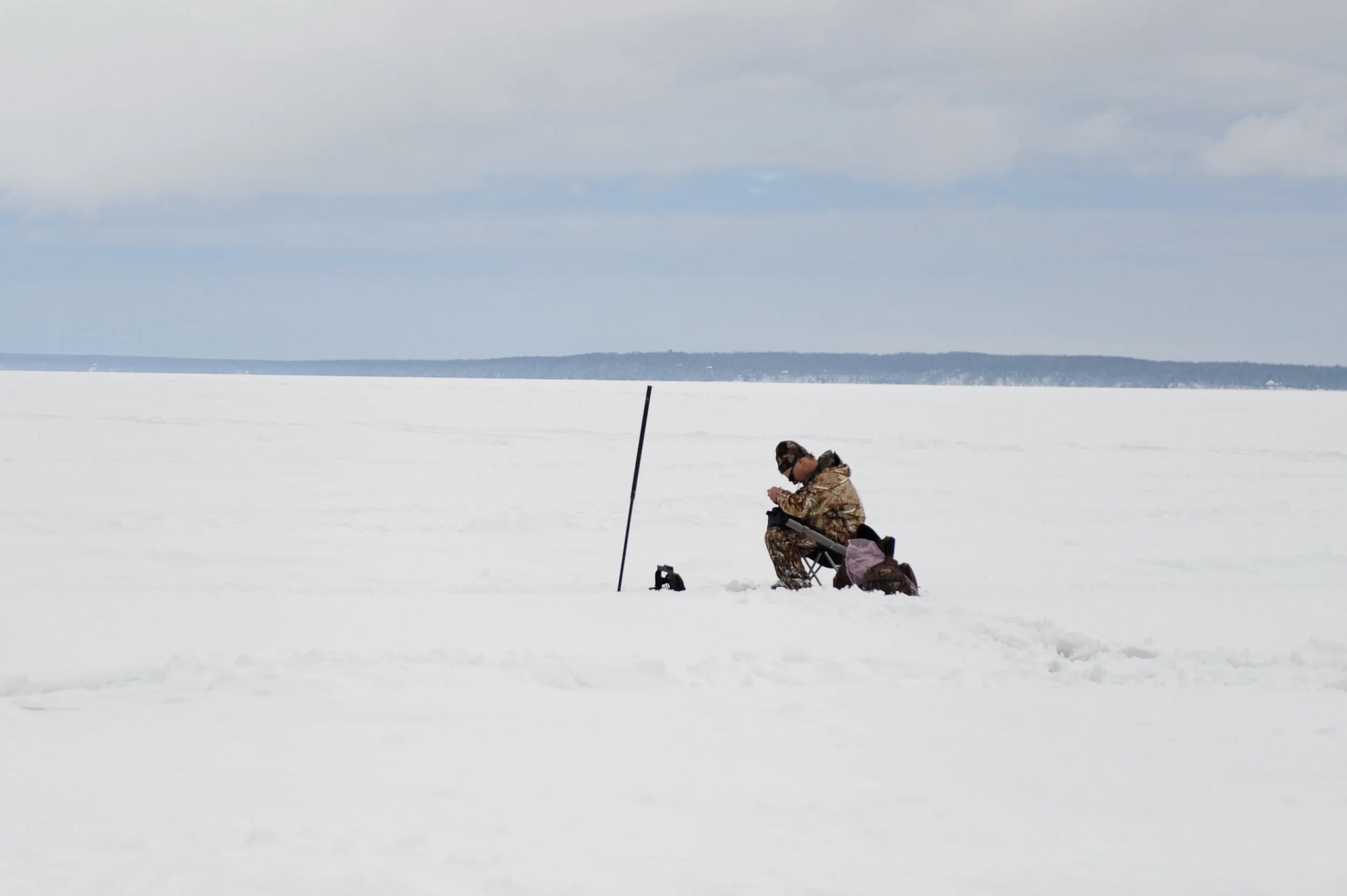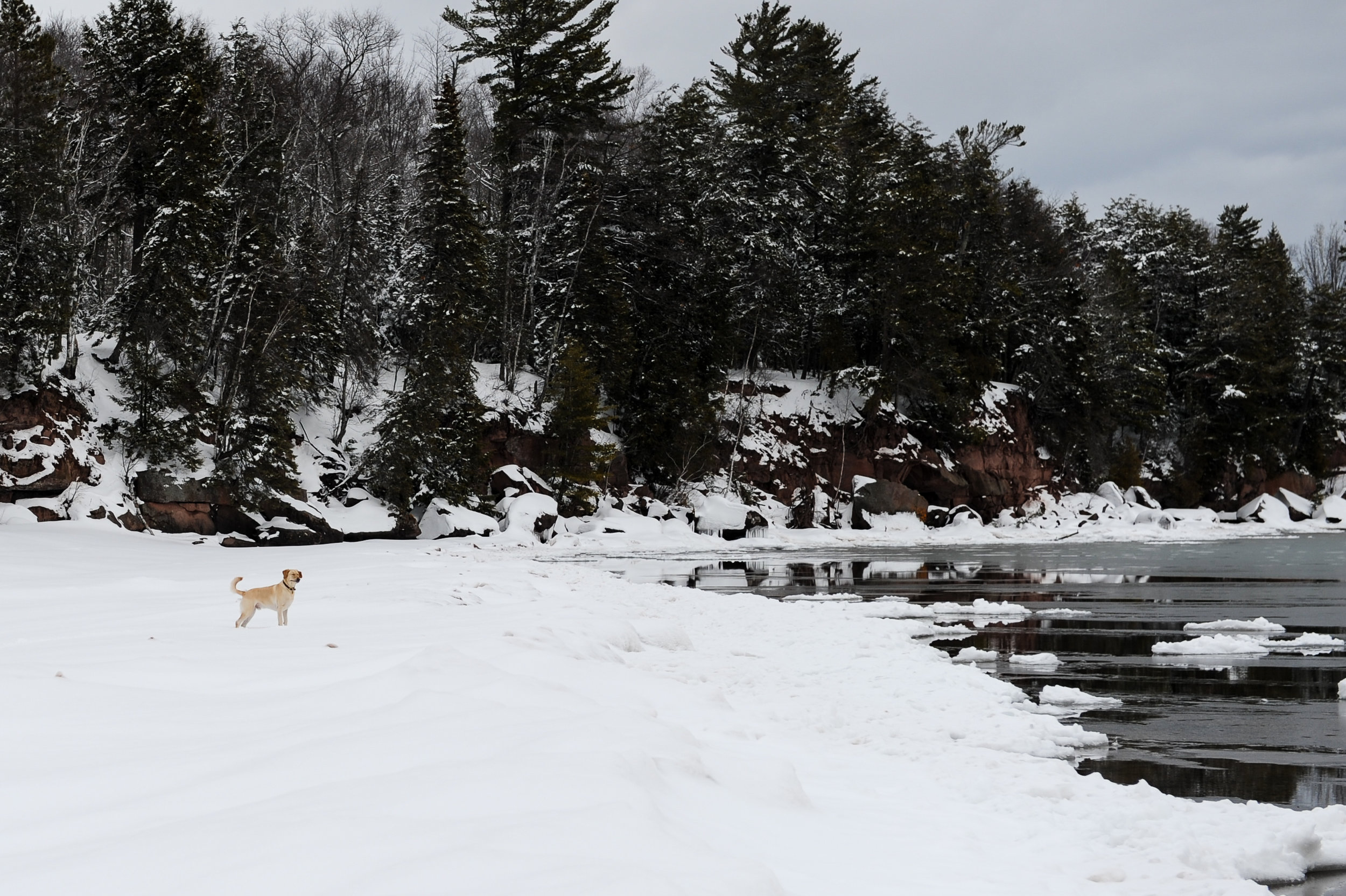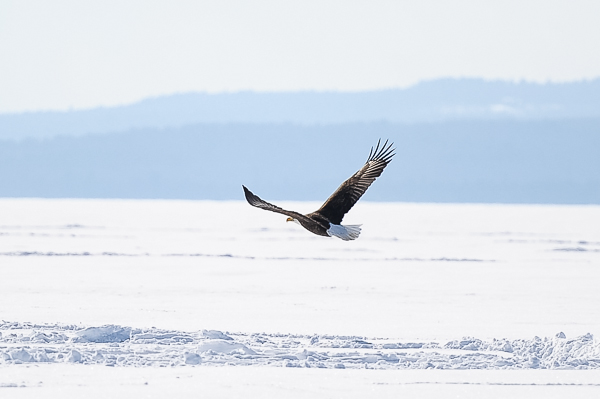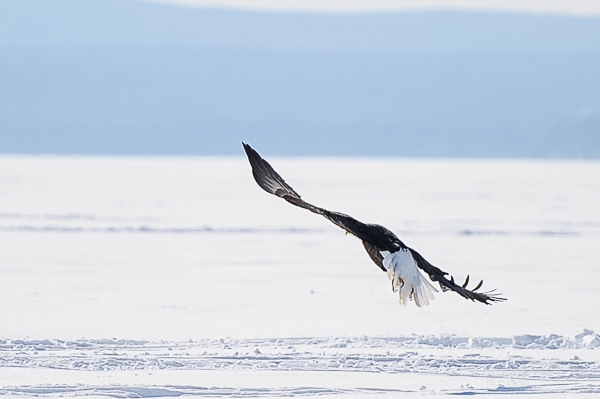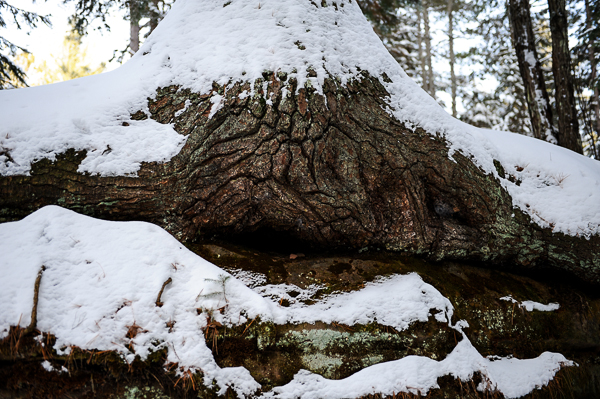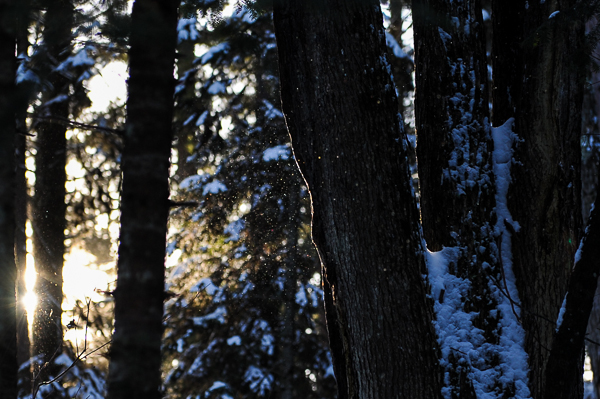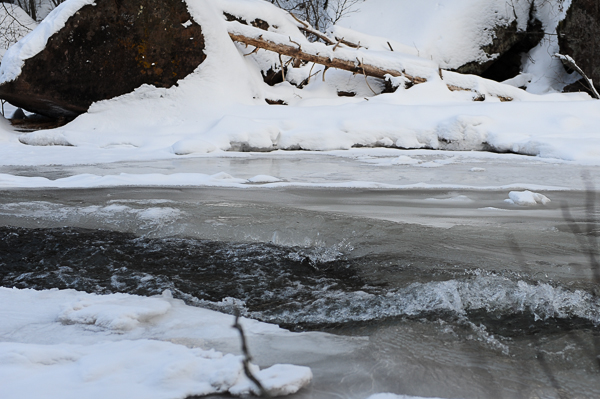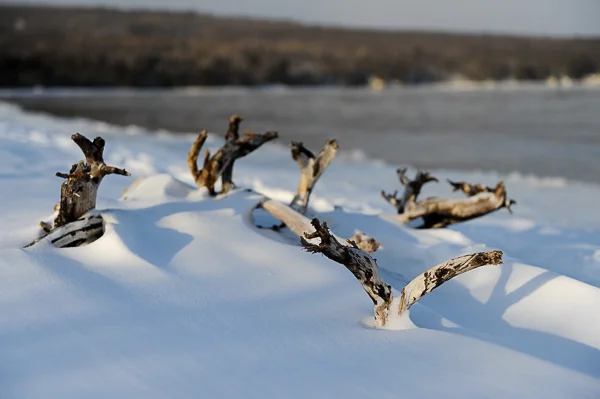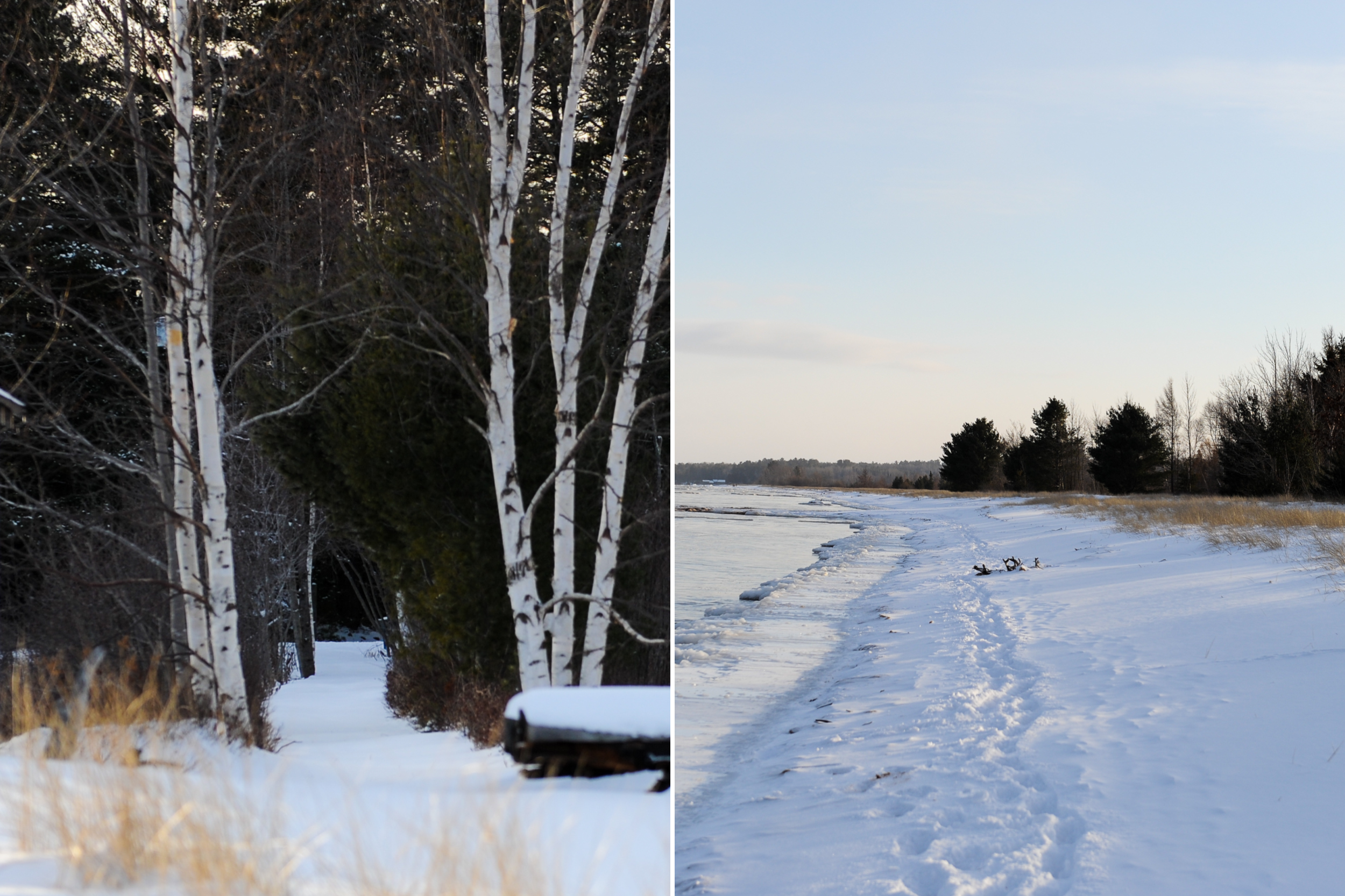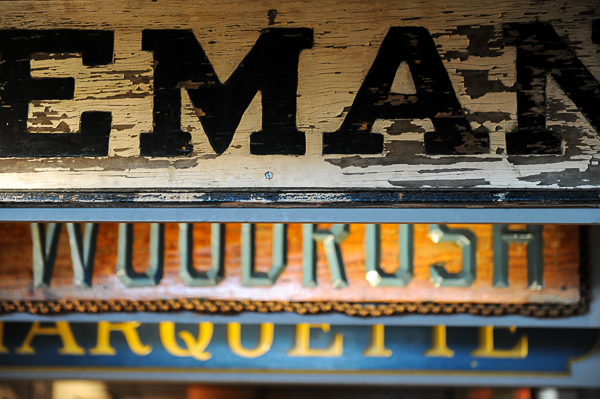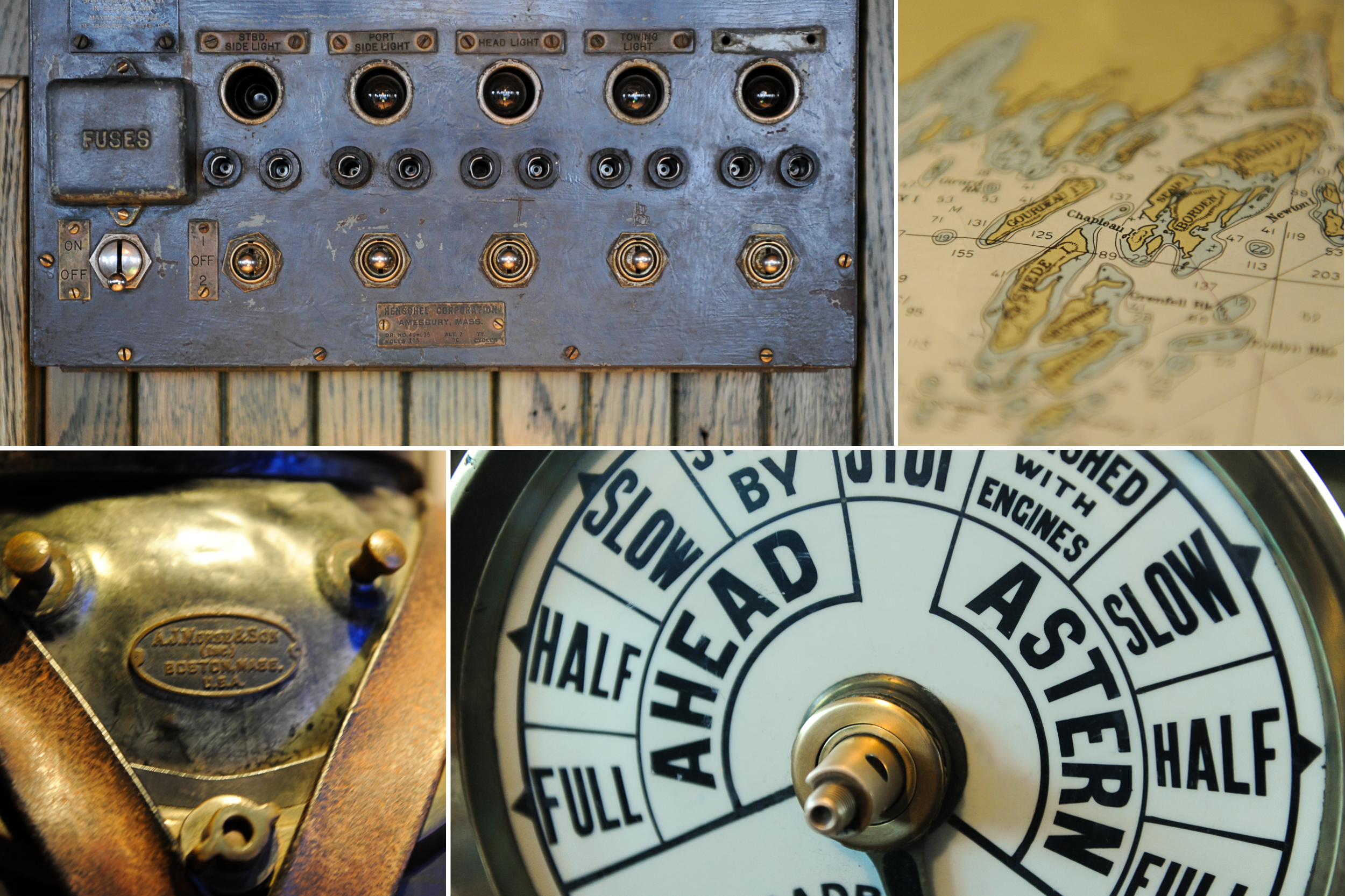Julian Bay is one of my favorite anchorages— it's open to the big Lake, the sand 'sings' when I walk on it and the tombolo is an amazing contrast the vast lake.
Read MoreCookery Maven Blog
Catching Sea Smoke
My first experience with sea smoke came in a bottle of Pinot Noir from California. While it's an elegant, earthy Pinot— the real deal over Lake Superior is far more impressive.
Read MoreIt Was A Glorious Summer
It's official, summer is over. Next week, our little town will be overrun by apple mad people, flooding Rittenhouse Avenue in the name of Applefest. When we were tourists and lived on our boat, Applefest weekend was always bittersweet— it signaled the official end to our Bayfield summers and the re-entry to city life without a big lake to frame our days. Now that we live here, Applefest still marks the end of summer but now we re-enter days with a slower cadence, longer, quieter nights, wood fires in the stove and those first, thrilling snowflakes. I have to admit, fall is my favorite time of year but summer sure is glorious. Thank God, she'll be back next year.
We had a picnic on Stockton Island— swimming, floating, jumping off the rocks, bratwurst and beer. Classic Wisconsin day.
Two boys, one dog and a bag of chips— it doesn't get much better than this.
Sadie is a champion tube rider and if you look closely, you'll see a grin the size of Texas on her face. I bet she'd hold her own in a rodeo— she knows how to hold on for dear life.
Seagulls and dogs are a mutually exclusive deal— Zeus arrived and the gulls departed.
Searching for beach glass.
A Long Island Farewell
It's not every day Jack moves to Madison to start his next chapter as a freshman Badger and such a momentous occasion begged for a stellar party. Shrimp boils are a Dougherty family favorite and have enough 'wow' factor to send Jack off to Madison with a little Bayfield flair. We loaded up the Karl with shrimp, green beans, a bucket of spices, potatoes and beer and headed to Long Island on a perfect August afternoon to celebrate the kid who, for nineteen years, has brought so much joy, pride, laughter and love into our lives.
We couldn't have asked for a better afternoon— no bugs, a sun-soaked beach, warm water, dear friends and a boiling kettle of spiced water, shrimp and Corn Man corn. It's hard to put into words what it felt like, knowing that in seven days we would be driving Jack to Madison and leaving him there, in a dorm with 6,000 other freshman. It was the kind of joy with a sharp edge, that made me catch my breath and blink back tears because I understood, for the first time, what bittersweet really meant. Jack was taking his first steps towards independence and away from us but the tapestry we've woven together from nights like these will always be his connection to home and the people who love him.
One of our friends, Teddy, wrote Jack a poem and gave him Edward Abbey's wise words for a happy life. As I watched Jack shake Teddy's hand, I knew everything was exactly as it should be. Jack was ready to move on, I was ready to let him go and we've been blessed with a lifetime of gratitude— for our family, friends, countless memorable dinners and the Lake and beaches that are the backdrop to our story.
'One final paragraph of advice: do not burn yourselves out. Be as I am - a reluctant enthusiast....a part-time crusader, a half-hearted fanatic. Save the other half of yourselves and your lives for pleasure and adventure. It is not enough to fight for the land; it is even more important to enjoy it. While you can. While it’s still here. So get out there and hunt and fish and mess around with your friends, ramble out yonder and explore the forests, climb the mountains, bag the peaks, run the rivers, breathe deep of that yet sweet and lucid air, sit quietly for a while and contemplate the precious stillness, the lovely, mysterious, and awesome space. Enjoy yourselves, keep your brain in your head and your head firmly attached to the body, the body active and alive, and I promise you this much; I promise you this one sweet victory over our enemies, over those desk-bound men and women with their hearts in a safe deposit box, and their eyes hypnotized by desk calculators. I promise you this; You will outlive the bastards.' Edward Abbey
It is always a thrill when the shrimp boil hits the table— it's sheer abundance of color and texture is amazing. It literally put a smile on everyone's face and it only got better as they ate their way through the pile of corn, shrimp, potatoes and green beans.
As the night wound down and the full moon rose over the South Channel, I took a minute to take it all in. I knew we'd be on this beach again but it would be different next time. I wanted to remember every last moment of it— Charlie's face when the boil hit the table, Jack filling up a Corona bottle with sand to take to Madison, Meghan triumphantly hoisting the paddle over head when she saw me on the beach and Will walking down the beach, camera in hand, to catch the sunset. On that August night, it was about as good as it gets and I couldn't have been happier.
I didn't want the night to end. Like all good parties, time flies when you're having fun and before we knew it, the sun had set, the boats were loaded and we were on our way back to Bayfield. Until Kathy had a brilliant idea— a moonlight swim in the South Channel. We stopped the boats, jumped into the water and spent ten minutes swimming under the luminescent moon. It was the perfect end to a perfect night.
Happy Cows In Mellen
'Good farmers, who take seriously their duties as stewards of Creation and of their land's inheritors, contribute to the welfare of society in more ways than society usually acknowledges, or even knows. These farmers produce valuable goods, of course; but they also conserve soil, they conserve water, they conserve wildlife, they conserve open space, they conserve scenery.'
Wendell Berry, Bringing it to the Table: Writings on Farming and Food.
I owe my introduction to the O'Dovero-Flesia farm to my quest for a seriously good hot dog. My preferred hot dog supplier, a meat market in Mellen, exited the sausage business a few years ago and while Hebrew Nationals are a good substitute, they just weren't the same. Everything changed when Pete told me about the O'Dovero's cattle farm and meat market— I was back in all beef, natural casing with a satisfying snap hot dog heaven. And, lucky for me, O'Dovero-Flesia heaven also included dry aged beef, the perfect pork belly for pancetta and a picturesque collection of cows, buildings and pastures.
Five generations of O'Dovero's have called these 1,000 acres at the base of the Penokee Hills home and as I pulled into the driveway, I can understand why— it's beautiful. The undulating pastures are framed by hardwood and pine forest, the Penokee hills rise up in the background and two barns with field stone foundations (built in the late 1920's/early 1930's) wear the weathered patina of 87 years of Wisconsin rain, wind, snow and sun.
The extraordinary (or not, depending on how you look at it) thing is it's still a working farm— raising cattle and supporting a family who are rooted in this place as much as the trees are rooted in the hillside. After nearly 90 years of mindful animal and land stewardship, the farm and family are faced with a nearly incomprehensible challenge— legislation has been purchased by an out of state mining company to allow an open-pit iron ore mine, literally, in their backyard. GTac, a Florida company owned by the 'New King of Coal' Chris Cline, plans to detonate 5.5 million tons of explosives every nine days until the pit measures 4.5 miles long— all within a mile of the O'Dovero's pastures, barns, cattle and home. It goes without saying, they are in a fight for their lives.
The cows on the farm reminded me of George, inquisitive and friendly. They were well taken care of and it showed in their demeanor and appearance. The best part of the day was speaking to Margaret, a member of the fifth generation and Veterinary student, about her connection to the farm and what's at stake if GTac starts to blow up the hills behind her house. The land, water and animals will be sacrificed, without consideration from a company who used money (and lots of it) to unethically re-write legislation to indemnify themselves from the damages that are inherent with any extraction industry.
Aldo Leopold said, 'There are two spiritual dangers in not owning a farm. One is the danger of supposing that breakfast comes from the grocery, and the other that heat comes from the furnace.' Since I am an enthusiastic meat-eater as well as a passionate animal lover, two seemingly contradictory terms, I spent some time thinking about the sacrifices inherent when we harvest, anything, for our consumption. How should we honor the harvest of any animal, plant or mountaintop for our dinner table, gas tank or warship? Acknowledging that sacrifice starts with mindful consumption, re-using what we can and remembering, always, that the resources we have are not endless.
Incredibly, thanks to our disconnected and pseudo-sanitized food system, we are able to purchase a plastic wrapped package of beef with an expiration date and a price on it and think the only components of the transaction are the exchange of currency at the checkout aisle. We forget, or choose to ignore, the elemental transaction that occurred on the farm, where the cow was raised and harvested. Because of this sense of separateness, we also forget that the knives we purchase, the cars we drive or the railroads used to transport our toilet paper were once deep in the earth, under mountaintops standing sentry over farms and communities. That's why farms like the O'Dovero's are important— they haven't forgotten and they understand the sacrifice they are asking of the animals in their care.
It's easy to pretend the meat we eat came from cows as happy as the O'Dovero cows or the steel in our cars came from a remote mountaintop without ties to a family's stories or traditions if we disregard an elemental truth— everything is connected. Albert Einstein said, 'A human being is a part of the whole called by us universe, a part limited in time and space. He experiences himself, his thoughts and feeling as something separated from the rest, a kind of optical delusion of his consciousness. This delusion is a kind of prison for us, restricting us to our personal desires and to affection for a few persons nearest to us. Our task must be to free ourselves from this prison by widening our circle of compassion to embrace all living creatures and the whole of nature in its beauty.' Once we free ourselves from the prison of separateness and we evaluate our consumption in the context of what sacrifices are necessary to fill our bellies, drive our cars or build warships, it's a game changer.
I drive a car, I use appliances and I'm sure there is a steel I-beam somewhere in my house but I can no longer ignore the fact that these conveniences extracted a cost somewhere, to a family or community who sacrificed their mountaintops, forests or clean water. The recognition of the inherent sacrifice in everything we consume begs the question— what do we value as a society? If the only currency that gets any traction is the almighty dollar, how do we begin to assign value to clean water, unmolested forests, healthy communities and happy cows? What is a sustainable and good way of life really worth? I know it feels like cool water rushing over my feet when I'm walking down a river bed. I know it sounds like the waves of Lake Superior lapping along the shore on Long Island. I know it looks like a group of cows resting in a bucolic meadow of a family farm. Why is it so hard to convince people that it's worth protecting? Is it because we are using the wrong currency?
Is a family farm like the O'Dovero's reason enough to stop a mine? Are the sacrifices GTac is asking of us worth it? On the surface, it seems like a simple proposition— Northern Wisconsin needs jobs and the iron ore in the ground has value, so the sacrifice of one family farm is a fair trade for 'economic prosperity'. But if we dig deeper and look at what's really on the chopping block, it becomes clear that considering only the economic component of the deal is short-sighted. What is the true cost of removing five generations of a family's stories and legacy from the land? What is the inherent value of the Bad River Watershed? How can we quantify what destroying hundreds of acres of trees, ferns, flowers, wild berries and mushrooms will mean to the people and animals who live in the Penokees? Maybe the most precious currencies go beyond empirical value and as a result, require very, very careful consideration when we are asking for their sacrifice. The Penokee hills, the Bad River Watershed, Lake Superior and the O'Dovero-Flesia farm are worth saving— the sacrifices are too great.
Sancerre Rose, Fini Sur La Paille & The Beach
Does rosé wine (the quintessential summer wine) have to be put away after Labor Day? I know that white shoes are déclassé after the first Monday in September and in case I missed the memo and there is a rule that I don't know about (you know how fond I am of group-think and rule following), I am getting this blog post out just in time. September is a beautiful month up here and I know we have plenty of beach days in our future but there's nothing like an August day on the beach. Before soccer practices, volleyball tournaments, dental appointments and school shopping start invading our calendar, previously free of any commitment but wine, cheese and a fire on the beach.
I remember the first time I had the pleasure of smearing a hunk of Michael's Fini Sur La Paille aged goat cheese on a cracker and popped it in my mouth— it's that good. The Chotard rosé (made from Pinot Noir grapes) was the perfect companion for the wheel of Fini in my fridge. Historically, I haven't been the biggest fan of rosé but this bottle changed my mind— it's bigger and creamier than a typical rosé but still has a lively acidity and clean finish. It's the perfect beach wine and when you throw a little French style aged goat cheese in the mix— it's a little slice of heaven.
These afternoons in the South Channel are etched in my brain— the kids, sandbars, blue water and the viscous light as the sun starts to set behind the hills. We've spent countless days on Long Island over the past fourteen years and it never gets old. There's always beach glass to find, boats to jump off, fires to build, forts to construct and walks to take. We are blessed to have the stories Long Island has given us in our trove of family memories.
Everybody needs beauty as well as bread, places to play in and pray in, where nature may heal and give strength to body and soul. John Muir
A Trio Of Islands- Oak, Devil's & Rocky
Summer is here, finally. It's been sunny for four days in a row, we are gearing up for the Fourth of July parade on Madeline Island tomorrow and we spent an afternoon in the islands— I'm ridiculously happy.
A message told in rock and driftwood.
Another message— this time told with a feather and driftwood.
George, sitting at attention and wondering why he has to wait for a potato chip.
The old fish camp on Manitou Island.
Sea caves at Devil's Island— crafted by water and wind.
Rocks on Rocky Island.
A feather veneer on granite.
Perfect rock placement.
The cormorant congregation moved on when the eagle came to visit the island.
In A Good Way Of Life
The old threads are unraveling,
Get your needles ready.
We are stitching a new quilt
of humanity.
Bring your old t-shirts,
worn out jeans, scarves,
antique gowns, aprons,
old pockets of plenty
who have held Earth's treasures,
stones, feathers, leaves,
love notes on paper.
Each stitch
A mindful meditation.
Each piece of material
A story.
The more colour the better,
so call in the tribes.
Threads of browns, whites,
reds, oranges
Women from all nations
start stitching.
Let's recycle the hate, the abuse,
the fear, the judgment.
Turn it over, wash it clean,
ring it out to dry.
It's a revolution
of recycled wears.
Threads of greens, blues, purples
Colourful threads
of peace, kindness,
respect, compassion
are being stitched
from one continent to the next
over forests, oceans, mountains.
The work is hard
Your fingers may bleed.
But each cloth stitched together
Brings together a community.
A world, our future world
Under one colourful quilt.
The new quilt of humanity.
~Julia Myers
It was a first for me, a Native American drum ceremony near the Potato River. But as I stood near the moving water making its way toward Lake Superior and listened to Tony DePerry offer his prayers, I knew I was in the right place. Meister Eckhart said, in the 13th century, 'if the only prayer you said in your whole life was, "thank you," that would suffice'. As I spread my tobacco into the water, I sent deeply heartfelt prayers of gratitude for Mother Earth, Lake Superior and the people who are re-imagining abundance and community in Northern Wisconsin.
Our souls have traveled through many lifetimes to be right here, right now— at a time when the heartbeat of a 2 billion year old mountain range, that once rivaled the Alps, and the largest body of freshwater in North America are threatened by human greed and the mining industry. Their shortsightedness has ignited a fire fueled by prayer, gatherings, ceremonies, story-telling and a re-definition of true, not stolen, power and influence that will not be extinguished.
A womb in bark— fitting for a space where the past is cherished and the future is being born amidst gratitude, feasting and ceremony.
We continued on our Saturday in the Penokees road trip to the Lac Courte Oreilles Harvest Camp near the proposed mine site and it was another eye opener. We walked into the camp and were met by Melvin, the head honcho, who warmly welcomed us and explained a few simple camp ground rules. In spite of the super-sized mosquitos, it was a magical place— a fully functioning settlement among the trees and rocks slated by GTac to become overburden.
An indigenous elder from British Columbia, Cecil Paul, told a story about a Magic Canoe, the preservation of the Kitlope, an old-growth forest in northern B.C. (story here) and the change that is possible when we gather around a fire, in a camp or in a mythical canoe. 'I was alone in a canoe," he (Paul) has said. "But it was a magic canoe. It was magic because it could make room for everyone who wanted to come on board, to come in and paddle together. The currents against us were very strong. But I believed we could reach our destination. And that we had to for our survival.'
'You know, you guys call it 'the Kitlope,'" Cecil says. "But in our language we call it 'Huchsduwachsdu Nuyem Jees.' That means 'the land of milky blue waters and the sacred stories contained in this place.' You think it's a victory because we saved the land. But what we really saved is our heritage -- our stories which are embedded in this place and which couldn't survive without it, and which contain all our wisdom for living.' The LCO Harvest Camp is a place where, regardless of where you come from, all our wisdom for living is alive and well, available to anyone who walks into the forest off Moore Road.
We are in for a long haul— GTac isn't going away anytime soon but they are showing their true colors, as are we. It's maddening when you realize what you cherish has been sold to the highest bidder but we are shining light, from the banks of the Potato River or the LCO Harvest Camp, on the death throes of greed, hubris and corruption that doesn't fit in the world we are re-imagining. Community, ceremony, legacy, conservation and stewardship— good places to start changing our world.
70 Percent Water
'Land and water are not really separate things, but they are separate words, and we perceive through words.'
David Rains Wallace, The Untamed Garden and Other Personal Essays
We are 70 percent water and fresh water is essential to our survival, two seemingly simple facts. I've heard them many times in my 43 years but ever since I've fallen in love with a vulnerable Great Lake, fresh water is always on my mind. Lake Superior, the last place on earth with clean and abundant fresh water, is threatened by the mining industries in Minnesota, Wisconsin, Michigan and Ontario. It's a foregone conclusion, regardless of the 'research' and 'engineering' a mining company will espouse, that pollution is a by-product of the extraction industries and any pollution, on the shores of 10 percent of the world's fresh water, is a global problem.
According to Water.org, , a child dies every 21 seconds from a water related illness, women in developing countries spend 200 million hours a day collecting water and 780 million people lack access to clean water. While 3.4 million people a year die from water related illnesses and the United Nations declared 2013 the Year of International Water Cooperation, there are companies (Polymet, GTac and Rio Tinto) seeking to build new iron ore, copper and nickel mines in the pristine wilderness on the shores of Lake Superior and putting fresh water at risk.
Where is the hue and cry? Where are the millions of people taking a stand against corporate greed? What happened to 'when you know better, you do better'? Why hasn't the global issue of access to clean water stopped these mining companies in their tracks? All good and maddening questions waiting to be answered. I do know the answer to one question posed by Aldo Leopold in A Sand County Almanac, 'Now, we face the question whether a still higher 'standard of living' is worth its cost in things natural, wild and free'— absolutely not because our standard of living in intricately linked to all things natural, wild and free and as such, any imbalance is the beginning of the end. I'm lucky to live in a community that shares my deep appreciation for the natural world and is working tirelessly to protect Lake Superior, a global resource, but we need more voices asking those questions and demanding answers.
When we first pulled into Justice Bay on Sand Island 14 years ago, I couldn't believe my eyes— the water was crystal clear and we could see straight down in 20 feet of water. We were used to the murky water of the Duluth harbor and I knew there was no going back after spending a week in the Apostle Islands. We didn't go back to Duluth and the Apostle Islands became the backdrop for our lives, memories and stories. I'm still awestruck at the pristine wilderness surrounding me, it's nothing short of a miracle that it's survived as long as it has. A miracle worth protecting for those who will come after me.
Ted and I took the kids and George out for an adventure in the Islands yesterday and we couldn't have asked for a more beautiful, sunny and calm day. There wasn't much wind so we decided to go all the way to Devil's and check out the sea caves. On the way to the caves, we charted a course that has become familiar to me— past Oak, Otter and Bear Islands. We've been fortunate to have spent many days and nights in the Islands and I wondered if someone, who has never been to Devil's or Lake Superior, would care if the Lake, the Penokees, the Kakagon Sloughs, the Upper Peninsula or the BWCA were destroyed by mining companies? Baba Dioum said, 'In the end we will conserve only what we love. We will love only what we understand. We will understand only what we are taught' and if people aren't taught to value, love and conserve these wild places, will they?
While there are lots of people who haven't stepped foot in the Penokee Hills, Oak Island or the BWCA, they understand the intrinsic value those wild places have in their lives. We are part of a greater whole and everyone, even the ones who seek to destroy the wilderness, has heard the earth's heartbeat— in a tree-fort as a 6-year-old, in a rumble of thunder on a warm summer night, in the caress of water while swimming, the sting of wind-driven snowflakes or the smell of pine needles warmed by the sun. Are these common experiences enough to stop the mining companies from ripping off mountain-tops, polluting watersheds and creating mountains of over-burden? If we all wake up from our slumber and open our eyes, then the answer is a resounding yes. Mining companies have operated in the Lake Superior Basin for years, with various degrees of pollution (remember Silver Bay and Reserve Mining) but it's time we realize the biggest resource in the basin is clean water, not the minerals deep in the earth.
The following websites for the Polymet Mine in Minnesota, the Rio Tinto Mine in Michigan and the Penokee Mine in Wisconsin are a good place to start to understand why Lake Superior, the Apostle Islands, the Penokee Hills, the Boundary Waters Canoe Area and the pristine wilderness of the Upper Peninsula of Michigan are worth saving. There is a long road ahead of us and conservation is a tough sell in a culture of greed and hubris but our voices raised in defense of Lake Superior can change the course those in power have plotted for us.
Aldo Leopold posed an important question in an article he wrote for Outdoor Life. I'd say that the mining industry will most definitely make a poor master and a legacy of good stewardship to the natural world will serve us, and the people who will come after us, far better.
‘For unnumbered centuries of human history the wilderness has given way. The priority of industry has become dogma. Are we as yet sufficiently enlightened to realize that we must now challenge that dogma, or do without our wilderness? Do we realize that industry, which has been our good servant, might make a poor master? Let no man expect that one lone government bureau is able—even tho it be willing—to thrash out this question alone.
….Our remnants of wilderness will yield bigger values to the nation’s character and health than they will to its pocketbook, and to destroy them will be to admit that the latter are the only values that interest us.’
Aldo Leopold ‘A Plea For Wilderness Hunting Grounds’ The Best of Outdoor Life: One Hundred Years of Classic Stories
Our First Long Island Day Of 2013
Katie, Dan Mollie and Jimmy came up for Jack's graduation this weekend and decided to spend the day with us on Long Island. We grabbed lunch stuff, packed the cooler and were in the boat by 11 am (which is amazing given the size of our crew).
I can't even begin to describe a day like today— it was simply glorious. Mary Oliver summed it up perfectly in her poem, Poppies, 'but I also say this: that light is an invitation to happiness, and that happiness, when it's done right, is a kind of holiness, palpable and redemptive'.
Will found a very, very small snapping turtle on one of our walks down the beach.
A dragonfly took a respite in Ted's hands and allowed me to snap a few photos.
Jack and Jimmy— the oldest and youngest boys in our family.
Flickers feathers on the beach and in the water.
While I would rather admire the beautiful Flicker feathers on a bird flying above me, they looked lovely under water.
After lunch, we walked down the beach towards the lighthouse.
Mollie took her time looking for shells, baby dragonflies and driftwood.
The kids had a long jump contest and Mollie was a serious contender.
Mollie and me— footprints in the sand.
Blue crawfish claws were the beach treasure of the day.
Long Island beach flag cast in sand— the summer of 2013 is off to a glorious start.
Three Days In April
You wouldn't know it if you looked out the window but it's April 14th today. We had a good, old-fashioned winter storm this week (10 inches of snow and howling wind) and I took these pictures over the course of three days to document our crazy April weather. We have another winter weather advisory posted for 3 - 5 additional inches of snow tonight— I can't believe the 4th of July is less than 3 months away!
April 9th and the storm is coming.
April 10th and the storm is here.
April 11th and the ice is gone and open water (and Canadian Geese) are back.
Au Revoir Ice Road, You Were Fun While You Lasted
Ice road conversations have a particular cadence— a) is there going to be an ice road this year? and b) is the ice road still open? In between those conversational poles, there are cars traveling back and forth and enjoying free and easy access to Madeline or the mainland. While the appearance of an ice road isn't a given, the death of the ice road is assured. On April 3rd, the United States Coast Guard Cutter ALDER came through and delivered the fatal blow and we said au revoir to the 2013 ice road.
The ALDER is a big boat— 225 feet long, 46 feet wide and way, way bigger than any ATV, wind sled or human on the ice that morning.
The ALDER and I have something in common— she gained her 'Great Lakes Cutter' status on my birthday, October 12th. A Libra ice cutter, who knew? I always thought ice cutters were Aries or Sagittarius, it's amazing what you learn on an April morning at an ice road funeral.
The ALDER stopped in front of the entry to the Apostle Islands Marina, turned around and headed back towards the big lake. I guess it had done all it could to unlock the ferry and fishing boats from their winter irons and was headed back to Duluth. It was hard to believe just six weeks ago, Will and I were on the ice road, headed to Madeline for our Sunday photo safari (read about it here).
She made quick work of the road, breaking up sheets of ice that had carried Islanders and Mainlanders back and forth for six weeks in the spring of 2013. It was a good road while it lasted but I wasn't sorry to see it go. Summer is coming and that means beach days, Long Island Cocktail Club, gardening, farmer's markets and bonfires. Plus, there's always the 2014 ice road to look forward to, right?
Madeline Island Ice Road
Every year, once the bay has frozen, there's a row of Christmas trees between Bayfield and Madeline Island. That's the sign that maybe, with the weather gods blessing, there will be a two-mile ice road connecting Madeline with the mainland. It's taken seven years but on February 24th I did it— I drove over the ice road to Madeline all by myself (and Will). We wanted to go to Big Bay Town Park if the ice road re-opened for business for our Sunday photo safari. Since Ted went skiing with Jack and Charlie at Whitecap, it was up to me to get the car (with all the windows down and seatbelts off) across the ice in one piece. I called Madelaine to inquire about tips and pointers for our voyage— she said drive slow and go between the orange cones (the road had cracked earlier in the week and the road had been re-routed prior to opening). I followed her directions to a 'T' and we made it across in one piece.
About half-way across we saw this guy fishing on the side of the ice road (officially Wisconsin County Highway H)—adds another dimension to the term 'road kill'.
The windsleds were parked at the Madeline Island approach, waiting for another chance to ferry people across in the window between hard ice and flowing water.
Of course, we brought George along for the ride. Will and I have decided he is the official dog of the Dougherty Photo Safaris. He brings elements of joy, vigilance and snowman manicuring skills to the adventure.
Big Bay Town Park didn't disappoint, it was definitely worth the ride.
The reflection of the shoreline in the water was framed by ice and snow. Everything seemed to be differing shades of grey, white and dark green but glimpses of the water outside the bay gave me hope for the eventual return of summer.
Since it was a monochromatic day, I decided to capture the delicate, crystalline structure of the ice and icicles.
The orange moss seemed eye-poppingly bright after spending ten minutes kneeling in the snow photographing icicles.
We decided to head back and my first thought was, 'what time does the ferry leave'? Then I remembered, we drove across the ice road and could leave when we wanted— a pretty unusual feeling on Madeline Island. We rolled down our windows, unbuckled our seatbelts and pointed the car towards Bayfield and home. It was another beautiful afternoon with Will and George, I'm a lucky, lucky girl.
Eagles On The Madeline Island Road
Last week, Ted and I went over to Madeline Island on the ice road for an afternoon excursion. Midway across, we saw two eagles waiting for a snack from the fishermen pulling their nets up. They are beautiful birds and I've never been lucky enough to capture a decent picture (before our Madeline ice road adventure). Talk about a happy dance, I was finally in the right place at the right time with the right lens on my camera. Life is good.
We Booked It Across The Bay
I can add another event with a 'K' in it to my résumé— this time it was a 10K ski 'race' across the bay between Ashland and Washburn. We were new to the whole 'booking it across the bay' event and I was excited for all of it (I had a bottle of champagne and a container of gorgonzola crackers cued up for a mid-ski snack) until I heard there was a bus ride involved. To say I'm not a fan of small spaces filled with people would be an enormous understatement and the added component of skis everywhere in the small space was enough to send me skiing back to Bayfield. I tried to suck it up and keep my claustrophobia in check but as we got closer to Washburn, doubt started to creep in my anxious little brain (it didn't help I managed to get the car stuck in a snow bank trying to park...I'm not the best driver).
As luck would have it, we were walking down the street to queue up for the dreaded bus ride and the most spectacular thing happened— an empty bus pulls up alongside of us and the bus driver asked if we wanted to get on (before the other 200 or so people in line). We answered with a resounding 'hell yeah', Jack and I grabbed the front seat (near the door) and away we went, not a hint of claustrophobia to be found. It was shaping up to be the best night of skiing across the lake, ever.
Of course, there were puppets at the start— a wolf and a polar bear. A little bit of whimsy before we set off on our epic night ski across the lake.
There were a lot of people at the start and we made sure to stay in the back. I think the fastest person finished in 23 minutes, our crew finished somewhere around the 3 hour mark. Not too shabby for a group of inexperienced Dougherty skiers and a 6-year-old Jackson. We were so far in the back, I'm not sure how the start of the race was announced but we made our way to the lake about 6:05 and started our trek towards the first rest stop.
There were quite a few people in the back with us. In fact, there were quite a few people everywhere— 3500 skiers, snowshoers and walkers signed up to book across the bay. It was a beautiful start— the sky was lit up with the remnants of sunlight, the moon and stars were just starting to reveal themselves and the seemingly unending line of twinkling luminaries spread out in front of us.
There were rest stops every kilometer with water, cookies, apple cider (adult and kid flavored) and bonfires to warm our getting colder by the minute fingers, faces and bodies. It was really cold out— about zero degree by the time we crossed the finish line.
One of the rest stops had a bonfire and a fire breathing dragon— it was seriously impressive.
We finished with smiles on our faces, frost in our hair and lots of good memories of our first book across the bay.
Fragile
If I ever had questions about the fragility of life, the past couple weeks put them to rest, for good. The first little 'ping' came two weeks ago when Will and I went for our Sunday photo safari. I woke up that morning with the phrase, 'the last places are worth saving' in my head and we set out to find a few photos of those last places. It's not difficult to find showstopping photos up here and within an hour, we were cold and headed home. On our way towards Bayfield, we saw two eagles being chased by a single crow right after we left the beach. One of the eagles had 'dinner' in his talons and Will and I were amazed at the chutzpah of that single crow. He was one wrong move away from becoming dinner himself. I couldn't stop wondering why a crow would be going up against two large eagles— was he too lazy to find his own dinner or was there a bigger message in the tableau Will and I were witnessing?
Of course, I thought it was symbolic of the David and Goliath mining battle playing out in the Penokees. Talk about fragile, the mine would pollute the Bad River watershed and subsequently Lake Superior. That kind of cause and effect is easy to understand— the bad guys pollute the water and the good guys lose everything. But what happens when it's not as clear and bad things happen anyway?
Within the past week, two eagles have died from lead poisoning (I'm not sure if they were the two eagles I saw with Will). The eagles, and other animals, eat gutpiles from deer carcasses and if the deer are killed with lead bullets, the gut piles are contaminated. To be fair, I'm not entirely sure the eagles died from scavenging lead contaminated deer carcasses but it drives home the message that everything is connected and something as benign, and even seemingly responsible, as leaving the gutpile from a harvested deer to feed eagles, coyotes, and whatever else is hungry can lead to unintended but deadly consequences.
I used to see an eagle in a tree at the mouth of the Sioux River and every time I drove over the bridge, I looked towards the lake to see if he was perched on the top branch. I haven't seen him since the news of the lead poisoning came out and I'm afraid he's gone. The sight of that eagle in the tree became a touchstone for me and I felt blessed every time I saw him. It's heavy when you realize every step, decision and movement you make has consequences, seen or unseen, and to plow blindly forward is not only selfish but irresponsible. It can feel immobilizing, the awareness of our woven destiny with everything that surrounds us. But what happens when the weave supports and sustains us?
Jim Hudson died last week and we are still reeling. Losing a man as loved and respected as Jim sent shock waves through every corner of our little town and I was reminded, again, of how we are all woven into the same tapestry. As I watched the horrible story unfold, I started to notice the support that was swelling to help Hannah, Jim's wife, after his passing. I also noticed the stories and testimonies about Jim and the legacy he left behind. He was tremendously loved, in Bayfield and beyond.
I think the first time I met Jim, he had George in the back of his police car (George had a fierce wanderlust in his early years) and with his characteristic smile, he dropped George off, swapped some fishing tips with Ted and went on his way. Over the years, I've gotten to know Jim and Hannah better and their generosity of spirit was remarkable. I remember the first time Hannah complimented Will on his photography, he was thrilled and I doubt he'll ever forget his first compliment from a professional photographer. That's just one example of how she fostered an environment where a 13-year-old boy could feel like a giant, I know there are many, many more. Talk about paying it forward, she has an overflowing account of good will, love and support coming her way.
All life is fragile and the delicate balance of our choices and their consequences can be overwhelming. From taking a stand for the Lake, eagles and other wildlife, to living your life in alignment with your deepest and most dearly held convictions, these are the threads that bind us together. There are bound to be losses that bring us to our knees but the tapestry we've built with our words, actions and lives will support us until we can walk on, towards what's next.
A bit of advice Given to a young Native American At the time of his initiation: As you go the way of life, You will see a great chasm. Jump. It is not as wide as you think.
Joseph Campbell
The Last Places Are Worth Saving
“The good life of any river may depend on the perception of its music; and the preservation of some music to perceive.” Aldo Leopold
'All ethics so far evolved rest upon a single premise: that the individual is a member of a community of interdependent parts. His instincts prompt him to compete for his place in that community, but his ethics prompt him also to co-operate (perhaps in order that there may be a place to compete for).
The land ethic simply enlarges the boundaries of the community to include soils, waters, plants, and animals, or collectively: the land.
This sounds simple: do we not already sing our love for and obligation to the land of the free and the home of the brave? Yes, but just what and whom do we love? Certainly not the soil, which we are sending helter-skelter downriver. Certainly not the waters, which we assume have no function except to turn turbines, float barges, and carry off sewage. Certainly not the plants, of which we exterminate whole communities without batting an eye. Certainly not the animals, of which we have already extirpated many of the largest and most beautiful species. A land ethic of course cannot prevent the alteration, management, and use of these 'resources,' but it does affirm their right to continued existence, and, at least in spots, their continued existence in a natural state.' Aldo Leopold A Sand County Almanac
I'm lucky to live in one of the world's 'last places', a place still relatively untouched by expansion and extraction. While a stand of old growth pines are a rarity due to logging and fisheries in Bayfield aren't shipping 12,000 barrels of whitefish and trout a year like they were in 1881; Lake Superior is still crystal clear and cold, white and red pines poke their heads up over the forest canopy and I can see every single star in the night sky. These are worth saving.
There are complicated issues facing Lake Superior— GTac, a company based in Florida, wants to build an open-pit (4.5 miles long, 1.5 miles wide and up 1,000 feet deep) taconite mine in the Penokee Mountains, six miles from the Bad River Reservation and Lake Superior. Twenty three creeks, streams and rivers flow directly into the Bad River Reservation, specifically the Kakagon Slough, and then into Lake Superior from the mine site. Sulfides, a by-product of mining, will flow directly downstream— decimating the wild rice beds, killing fish and polluting 10 percent of the world's fresh water. Sounds like a no-brainer— who would want to pollute one of the most beautiful places on Earth? The complications arise from the real and pressing problem of poverty and unemployment. A promise (valid or not) of 700 'good paying' jobs are a Siren's song to people who are looking for relief from financial distress. However, the question remains— what is our legacy to the people, animals and trees who come after us?
'For unnumbered centuries of human history the wilderness has given way. The priority of industry has become dogma. Are we as yet sufficiently enlightened to realize that we must now challenge that dogma, or do without our wilderness? Do we realize that industry, which has been our good servant, might make a poor master? Let no man expect that one lone government bureau is able—even tho it be willing—to thrash out this question alone.
....Our remnants of wilderness will yield bigger values to the nation's character and health than they will to its pocketbook, and to destroy them will be to admit that the latter are the only values that interest us.' Aldo Leopold 'A Plea For Wilderness Hunting Grounds' The Best of Outdoor Life: One Hundred Years of Classic Stories
When I was 8 or 9, my Mom, Bridget, Tom and I took an Amtrak train to Duluth, it was a big deal. We met my Dad at the Radisson and had dinner in the rotating restaurant on the top floor. As the harbor came into view, I remember seeing the lake stretch out for miles and was awestruck. That dinner in a slowly spinning restaurant was the start of my lifelong love affair with Lake Superior, a Midwestern inland ocean.
The lake has been a backdrop to so many of our family stories: Ted asked me to marry him on the Moccasin Mike Road beach, I slept in a tent for the first time on that same beach, Jack had his first pickle on the patio at Sir Ben's, a canoe ride north of Two Harbors inspired our purchase of Isle of Skye, we saw our first moose in Washington Harbor on Isle Royale, we saw caribou in the Slate Islands, the kids jumped off cliffs on Devil's Island, we walked up to the top of Mt Ashwabay on my birthday, I swam with Guinness, our Newfie, in Julian Bay, spent countless days on the beaches of Long Island, driving on the ice road, with all the windows down, to Madeline Island, my first sauna on Spain Island near Loon Harbor, the list literally goes on and on. At the end of my time here, I'll leave behind my children and the memories we've made together. Legacy is all we have and our family legacy is forever intertwined with Lake Superior and her shores.
I met literally hundreds of people at Good Thyme and over the course of those evenings, I realized three things: people crave a sense of belonging, they want to create memories and part of the magic of their visit up here was the lake's steadfast constancy. I heard countless stories about rituals and legacies: families who came up to the same cabin every year, beach glass collected to take home, epic rock skipping contests, wedding and subsequent anniversary dinners spent at the restaurant, the first ferry ride to Madeline Island, kayaking in the sea caves, again, the list goes on and on. I'm not unique in my deep affection for this place; there are a million ways to fall in love with Lake Superior and I've seen it in the eyes of people when they shared stories of 'their' lake.
'If in a city we had six vacant lots available to the youngsters of a certain neighborhood for playing ball, it might be "development" to build houses on the first, and the second, and the third, and the fourth, and even the fifth, but when we build houses on the last one, we forget what houses are for. The sixth house would not be development at all, but rather it would be mere short-sighted stupidity. "Development" is like Shakespeare's virtue, "which grown into a pleurisy, dies of its own too-much."
In objection to the dedication of the Gila as a permanent wilderness hunting ground, it has been truly said that a part of the area which would be "locked up" bears valuable stands of timber. I admit that this is true. Likewise, might our sixth lot be a corner lot, and hence very valuable for a grocery store or a filling station. I still insist it is the last lot for a needed playground, and this being the case, I am not interested in grocery stores or filling stations, of which we have a fair to middling supply elsewhere.' Aldo Leopold 'A Plea For Wilderness Hunting Grounds' The Best of Outdoor Life: One Hundred Years of Classic Stories
Extraction is quick and dirty— there is lots of action, fuss and bluster, money is promised and delivered (hopefully) but extractions, at their core, are not endless. Eventually, we'll run out of taconite, the action and money leaves to find another mistress and we're left with a shadow of the beauty and majesty that once was a blessed and integral part of our daily life. At some point, we have to decide the resources we have so generously been given are not endless and deserve our utmost respect and thanks. If I had a wish for my children and grandchildren, it would be they can see and feel the lake that has provided solace, joy and deep peace to their mother and grandmother. I would wish they could continue to add to the tapestry Ted and I started when they were born and pass on a legacy of gratitude and stewardship for one of the great wonders of the world.
What does stewardship and sustainability really mean? Is it possible to re-imagine an economy where we have enough and we re-define abundance? Is there any common ground between a neighborhood in Minneapolis creating a sense of community with a garden and a group of people in the Chequamegon Bay creating a sense of community with a movement to protect Lake Superior? Absolutely. As Aldo Leopold said, 'the land ethic simply enlarges the boundaries of the community to include soils, waters, plants, and animals, or collectively: the land'. I don't believe we can function in a sustainable way without practicing good stewardship to the people, animals, land and water where we set down our roots. I believe protecting Lake Superior is a good place to start. I believe we are connected in a myriad of unseen but deeply felt ways and these last places— Lake Superior, the Penokees and the Bad River Watershed are worth saving.
'A thing is right when it tends to preserve the integrity, stability and beauty of the biotic community. It is wrong when it tends otherwise.' Aldo Leopold
What Happens When The Moon Doesn't Cooperate?
You get a decent shot of a windswept fishing boat in the harbor. I was on my way to feed Gen's horses when the full yellow moon caught my eye. I turned around to get my camera and headed to the lake to get a picture (I figured the horses wouldn't mind a dinner delay if it was for a good cause). I was feeling a little cocky about my moon picture-taking prowess and thought, f/11 and 1/250 was the magic ticket. Wrong-o. Maybe it was too windy, the moon was rising too fast or that it was 30 degrees below zero and I didn't have a hat or gloves on but I ended up with this less than stellar lunar image on the right. I captured the image on the left about 20 minutes later, as I was headed home after apologizing to the herd and promising to only take pictures after they've eaten. Room for growth is a good thing, right?
Canal Park Safari
Julie and I took the kids to Duluth before Thanksgiving for a photo safari and lunch at Pizza Luce. We walked around, snapping pictures of whatever caught our fancy and finished our safari with caramel apples from Rocky Mountain Chocolate Factory. All in all, a successful safari.
We stopped into the Maritime Museum mid-safari. It was windy and cold outside and a respite in a warm building sounded like a good plan of action.

